Identifying Reasons for Changing Consumer Behavior in Hotels
VerifiedAdded on 2023/01/09
|19
|6011
|93
AI Summary
This research project aims to identify the reasons behind changing consumer behavior in hotels, with a focus on The Berkeley hotel. The study uses both primary and secondary research methods to evaluate the factors influencing consumer behavior and recommend strategies for customer retention.
Contribute Materials
Your contribution can guide someone’s learning journey. Share your
documents today.
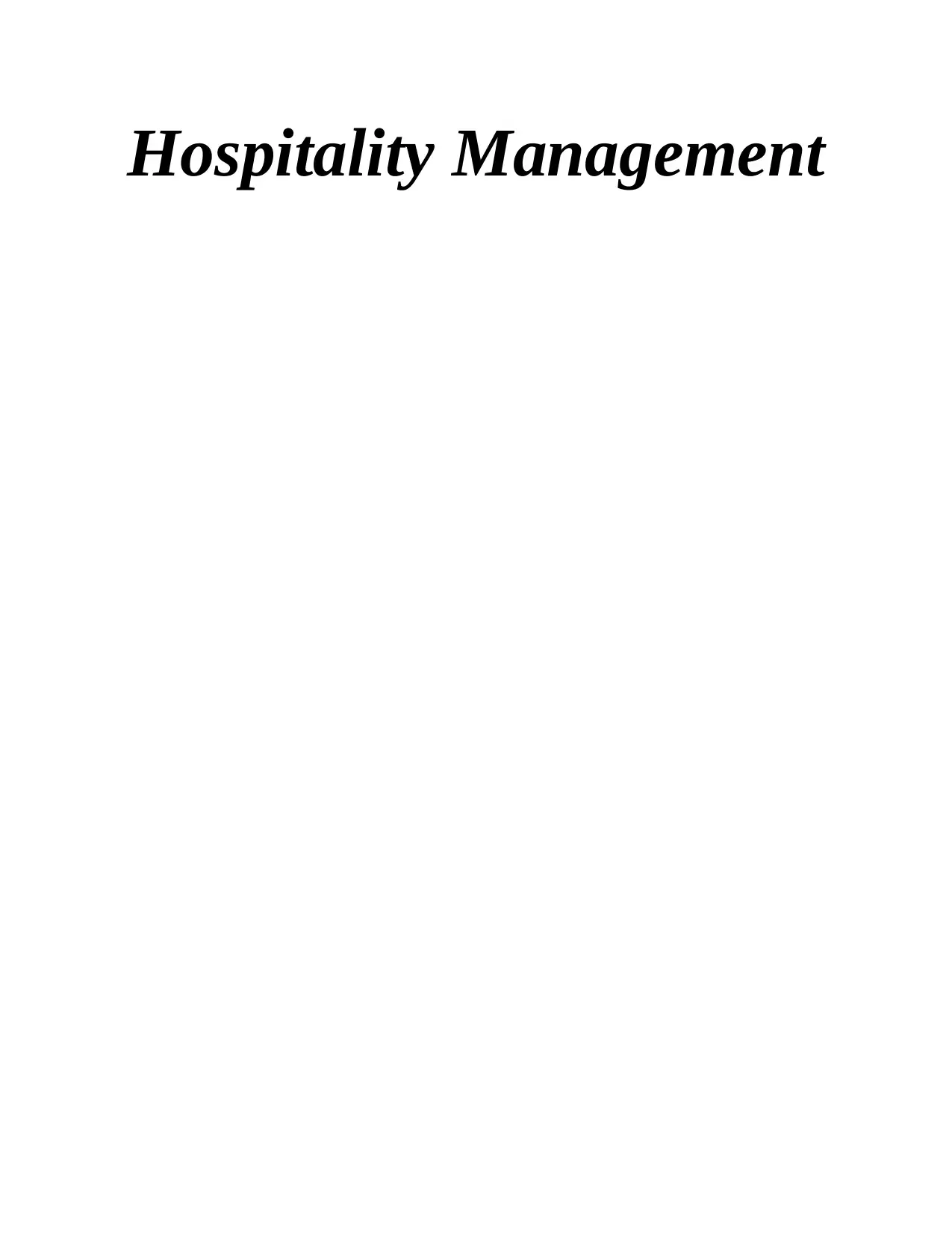
Hospitality Management
Secure Best Marks with AI Grader
Need help grading? Try our AI Grader for instant feedback on your assignments.
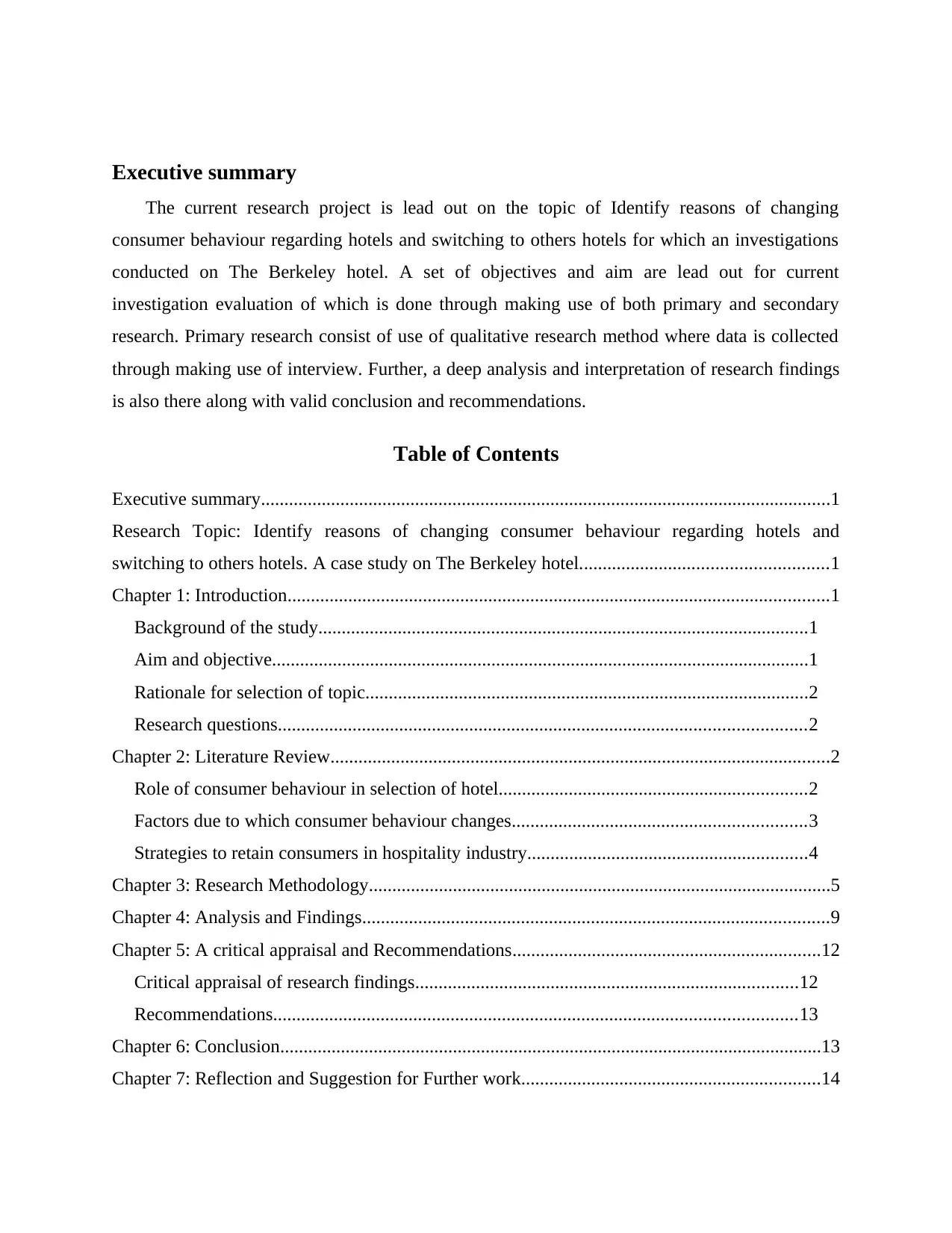
Executive summary
The current research project is lead out on the topic of Identify reasons of changing
consumer behaviour regarding hotels and switching to others hotels for which an investigations
conducted on The Berkeley hotel. A set of objectives and aim are lead out for current
investigation evaluation of which is done through making use of both primary and secondary
research. Primary research consist of use of qualitative research method where data is collected
through making use of interview. Further, a deep analysis and interpretation of research findings
is also there along with valid conclusion and recommendations.
Table of Contents
Executive summary..........................................................................................................................1
Research Topic: Identify reasons of changing consumer behaviour regarding hotels and
switching to others hotels. A case study on The Berkeley hotel.....................................................1
Chapter 1: Introduction....................................................................................................................1
Background of the study.........................................................................................................1
Aim and objective...................................................................................................................1
Rationale for selection of topic...............................................................................................2
Research questions.................................................................................................................2
Chapter 2: Literature Review...........................................................................................................2
Role of consumer behaviour in selection of hotel..................................................................2
Factors due to which consumer behaviour changes...............................................................3
Strategies to retain consumers in hospitality industry............................................................4
Chapter 3: Research Methodology...................................................................................................5
Chapter 4: Analysis and Findings....................................................................................................9
Chapter 5: A critical appraisal and Recommendations..................................................................12
Critical appraisal of research findings..................................................................................12
Recommendations................................................................................................................13
Chapter 6: Conclusion....................................................................................................................13
Chapter 7: Reflection and Suggestion for Further work................................................................14
The current research project is lead out on the topic of Identify reasons of changing
consumer behaviour regarding hotels and switching to others hotels for which an investigations
conducted on The Berkeley hotel. A set of objectives and aim are lead out for current
investigation evaluation of which is done through making use of both primary and secondary
research. Primary research consist of use of qualitative research method where data is collected
through making use of interview. Further, a deep analysis and interpretation of research findings
is also there along with valid conclusion and recommendations.
Table of Contents
Executive summary..........................................................................................................................1
Research Topic: Identify reasons of changing consumer behaviour regarding hotels and
switching to others hotels. A case study on The Berkeley hotel.....................................................1
Chapter 1: Introduction....................................................................................................................1
Background of the study.........................................................................................................1
Aim and objective...................................................................................................................1
Rationale for selection of topic...............................................................................................2
Research questions.................................................................................................................2
Chapter 2: Literature Review...........................................................................................................2
Role of consumer behaviour in selection of hotel..................................................................2
Factors due to which consumer behaviour changes...............................................................3
Strategies to retain consumers in hospitality industry............................................................4
Chapter 3: Research Methodology...................................................................................................5
Chapter 4: Analysis and Findings....................................................................................................9
Chapter 5: A critical appraisal and Recommendations..................................................................12
Critical appraisal of research findings..................................................................................12
Recommendations................................................................................................................13
Chapter 6: Conclusion....................................................................................................................13
Chapter 7: Reflection and Suggestion for Further work................................................................14
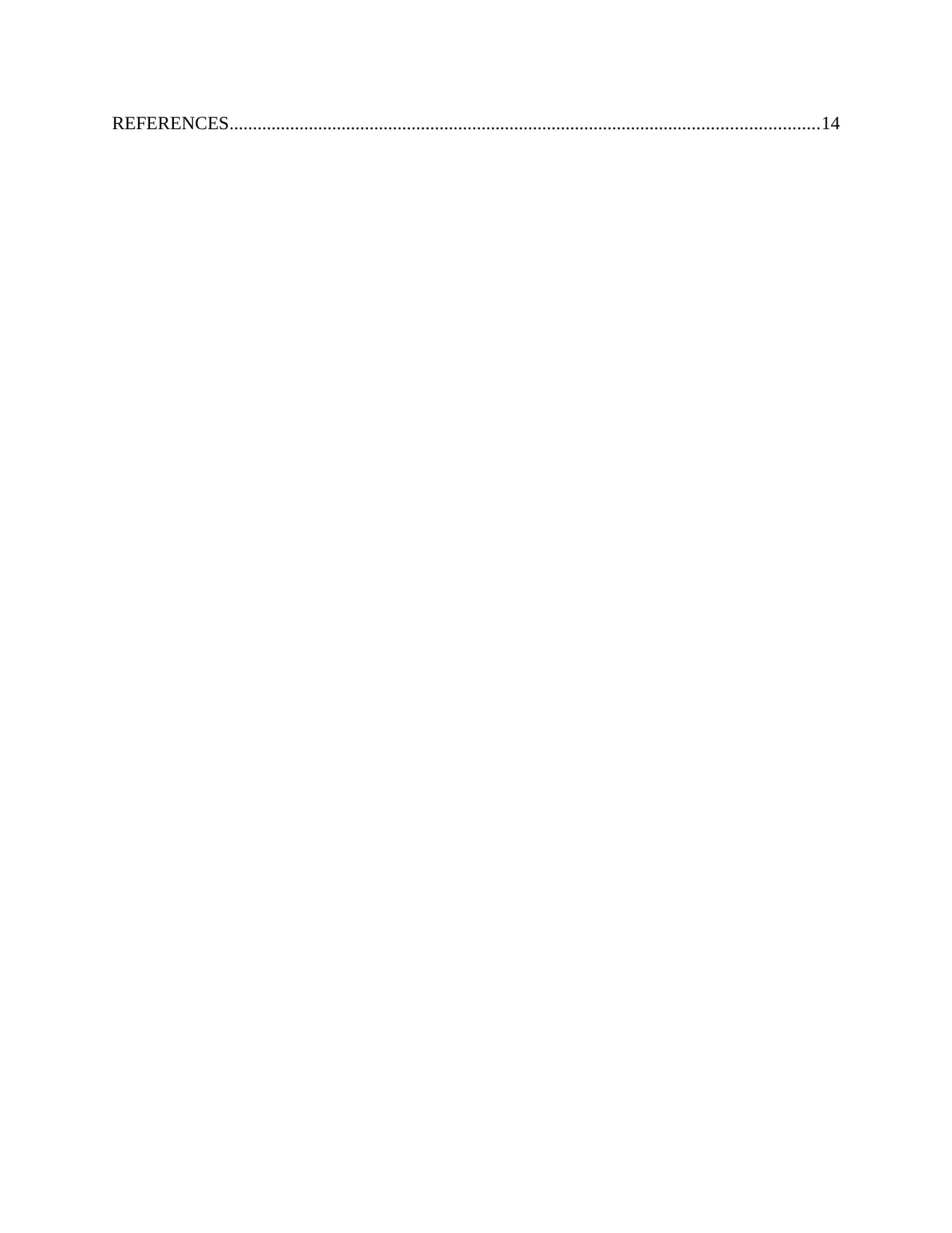
REFERENCES..............................................................................................................................14
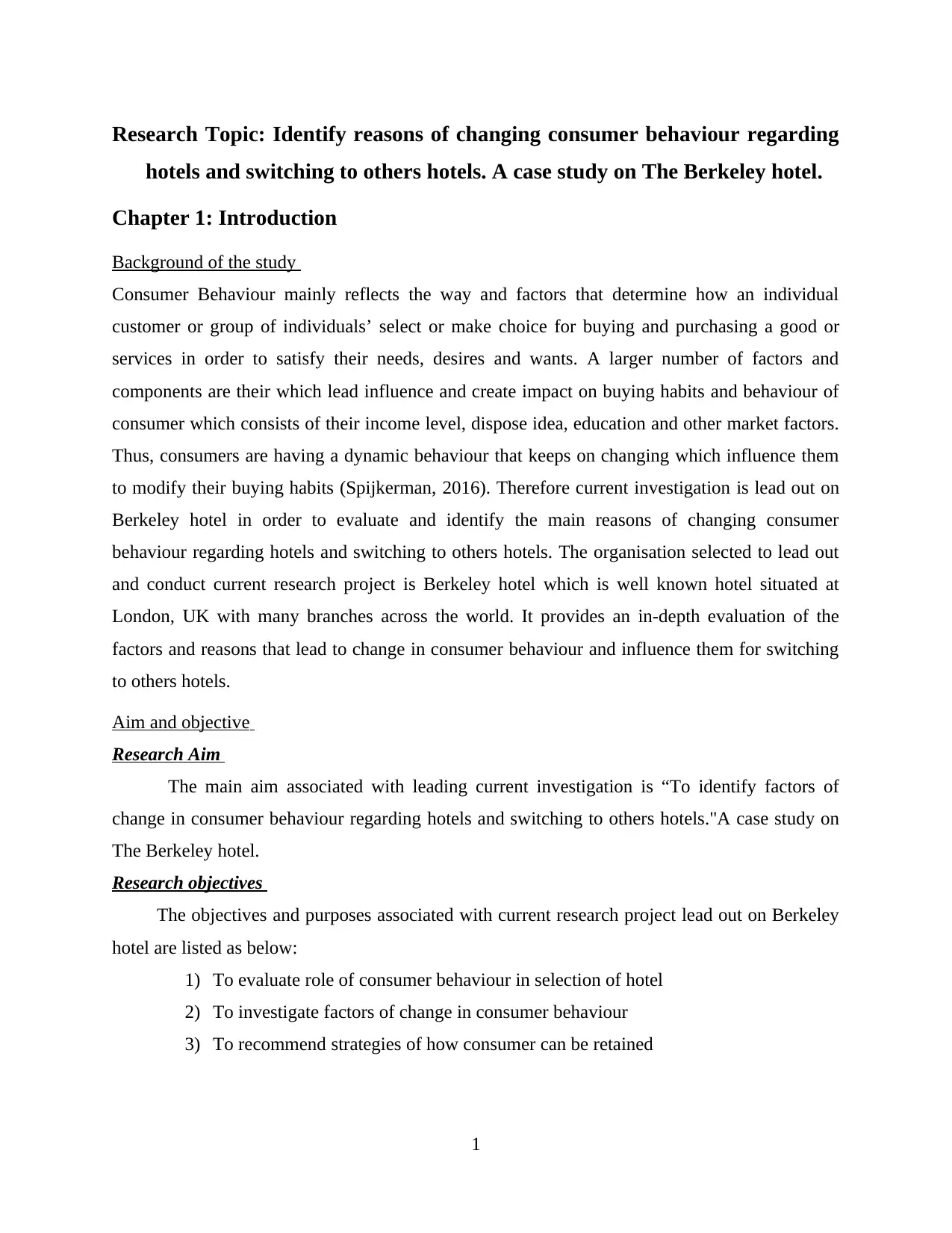
Research Topic: Identify reasons of changing consumer behaviour regarding
hotels and switching to others hotels. A case study on The Berkeley hotel.
Chapter 1: Introduction
Background of the study
Consumer Behaviour mainly reflects the way and factors that determine how an individual
customer or group of individuals’ select or make choice for buying and purchasing a good or
services in order to satisfy their needs, desires and wants. A larger number of factors and
components are their which lead influence and create impact on buying habits and behaviour of
consumer which consists of their income level, dispose idea, education and other market factors.
Thus, consumers are having a dynamic behaviour that keeps on changing which influence them
to modify their buying habits (Spijkerman, 2016). Therefore current investigation is lead out on
Berkeley hotel in order to evaluate and identify the main reasons of changing consumer
behaviour regarding hotels and switching to others hotels. The organisation selected to lead out
and conduct current research project is Berkeley hotel which is well known hotel situated at
London, UK with many branches across the world. It provides an in-depth evaluation of the
factors and reasons that lead to change in consumer behaviour and influence them for switching
to others hotels.
Aim and objective
Research Aim
The main aim associated with leading current investigation is “To identify factors of
change in consumer behaviour regarding hotels and switching to others hotels."A case study on
The Berkeley hotel.
Research objectives
The objectives and purposes associated with current research project lead out on Berkeley
hotel are listed as below:
1) To evaluate role of consumer behaviour in selection of hotel
2) To investigate factors of change in consumer behaviour
3) To recommend strategies of how consumer can be retained
1
hotels and switching to others hotels. A case study on The Berkeley hotel.
Chapter 1: Introduction
Background of the study
Consumer Behaviour mainly reflects the way and factors that determine how an individual
customer or group of individuals’ select or make choice for buying and purchasing a good or
services in order to satisfy their needs, desires and wants. A larger number of factors and
components are their which lead influence and create impact on buying habits and behaviour of
consumer which consists of their income level, dispose idea, education and other market factors.
Thus, consumers are having a dynamic behaviour that keeps on changing which influence them
to modify their buying habits (Spijkerman, 2016). Therefore current investigation is lead out on
Berkeley hotel in order to evaluate and identify the main reasons of changing consumer
behaviour regarding hotels and switching to others hotels. The organisation selected to lead out
and conduct current research project is Berkeley hotel which is well known hotel situated at
London, UK with many branches across the world. It provides an in-depth evaluation of the
factors and reasons that lead to change in consumer behaviour and influence them for switching
to others hotels.
Aim and objective
Research Aim
The main aim associated with leading current investigation is “To identify factors of
change in consumer behaviour regarding hotels and switching to others hotels."A case study on
The Berkeley hotel.
Research objectives
The objectives and purposes associated with current research project lead out on Berkeley
hotel are listed as below:
1) To evaluate role of consumer behaviour in selection of hotel
2) To investigate factors of change in consumer behaviour
3) To recommend strategies of how consumer can be retained
1
Secure Best Marks with AI Grader
Need help grading? Try our AI Grader for instant feedback on your assignments.
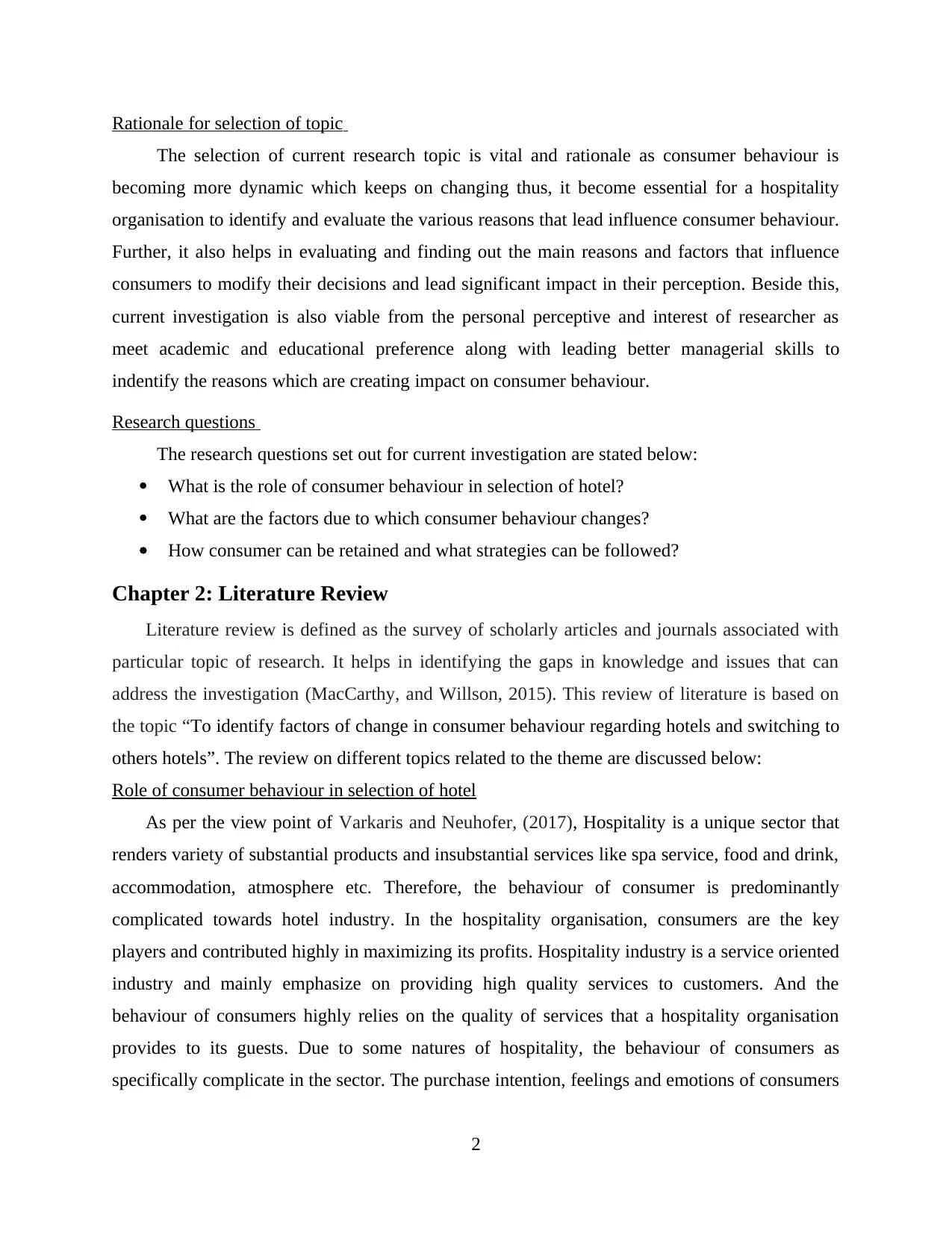
Rationale for selection of topic
The selection of current research topic is vital and rationale as consumer behaviour is
becoming more dynamic which keeps on changing thus, it become essential for a hospitality
organisation to identify and evaluate the various reasons that lead influence consumer behaviour.
Further, it also helps in evaluating and finding out the main reasons and factors that influence
consumers to modify their decisions and lead significant impact in their perception. Beside this,
current investigation is also viable from the personal perceptive and interest of researcher as
meet academic and educational preference along with leading better managerial skills to
indentify the reasons which are creating impact on consumer behaviour.
Research questions
The research questions set out for current investigation are stated below:
What is the role of consumer behaviour in selection of hotel?
What are the factors due to which consumer behaviour changes?
How consumer can be retained and what strategies can be followed?
Chapter 2: Literature Review
Literature review is defined as the survey of scholarly articles and journals associated with
particular topic of research. It helps in identifying the gaps in knowledge and issues that can
address the investigation (MacCarthy, and Willson, 2015). This review of literature is based on
the topic “To identify factors of change in consumer behaviour regarding hotels and switching to
others hotels”. The review on different topics related to the theme are discussed below:
Role of consumer behaviour in selection of hotel
As per the view point of Varkaris and Neuhofer, (2017), Hospitality is a unique sector that
renders variety of substantial products and insubstantial services like spa service, food and drink,
accommodation, atmosphere etc. Therefore, the behaviour of consumer is predominantly
complicated towards hotel industry. In the hospitality organisation, consumers are the key
players and contributed highly in maximizing its profits. Hospitality industry is a service oriented
industry and mainly emphasize on providing high quality services to customers. And the
behaviour of consumers highly relies on the quality of services that a hospitality organisation
provides to its guests. Due to some natures of hospitality, the behaviour of consumers as
specifically complicate in the sector. The purchase intention, feelings and emotions of consumers
2
The selection of current research topic is vital and rationale as consumer behaviour is
becoming more dynamic which keeps on changing thus, it become essential for a hospitality
organisation to identify and evaluate the various reasons that lead influence consumer behaviour.
Further, it also helps in evaluating and finding out the main reasons and factors that influence
consumers to modify their decisions and lead significant impact in their perception. Beside this,
current investigation is also viable from the personal perceptive and interest of researcher as
meet academic and educational preference along with leading better managerial skills to
indentify the reasons which are creating impact on consumer behaviour.
Research questions
The research questions set out for current investigation are stated below:
What is the role of consumer behaviour in selection of hotel?
What are the factors due to which consumer behaviour changes?
How consumer can be retained and what strategies can be followed?
Chapter 2: Literature Review
Literature review is defined as the survey of scholarly articles and journals associated with
particular topic of research. It helps in identifying the gaps in knowledge and issues that can
address the investigation (MacCarthy, and Willson, 2015). This review of literature is based on
the topic “To identify factors of change in consumer behaviour regarding hotels and switching to
others hotels”. The review on different topics related to the theme are discussed below:
Role of consumer behaviour in selection of hotel
As per the view point of Varkaris and Neuhofer, (2017), Hospitality is a unique sector that
renders variety of substantial products and insubstantial services like spa service, food and drink,
accommodation, atmosphere etc. Therefore, the behaviour of consumer is predominantly
complicated towards hotel industry. In the hospitality organisation, consumers are the key
players and contributed highly in maximizing its profits. Hospitality industry is a service oriented
industry and mainly emphasize on providing high quality services to customers. And the
behaviour of consumers highly relies on the quality of services that a hospitality organisation
provides to its guests. Due to some natures of hospitality, the behaviour of consumers as
specifically complicate in the sector. The purchase intention, feelings and emotions of consumers
2
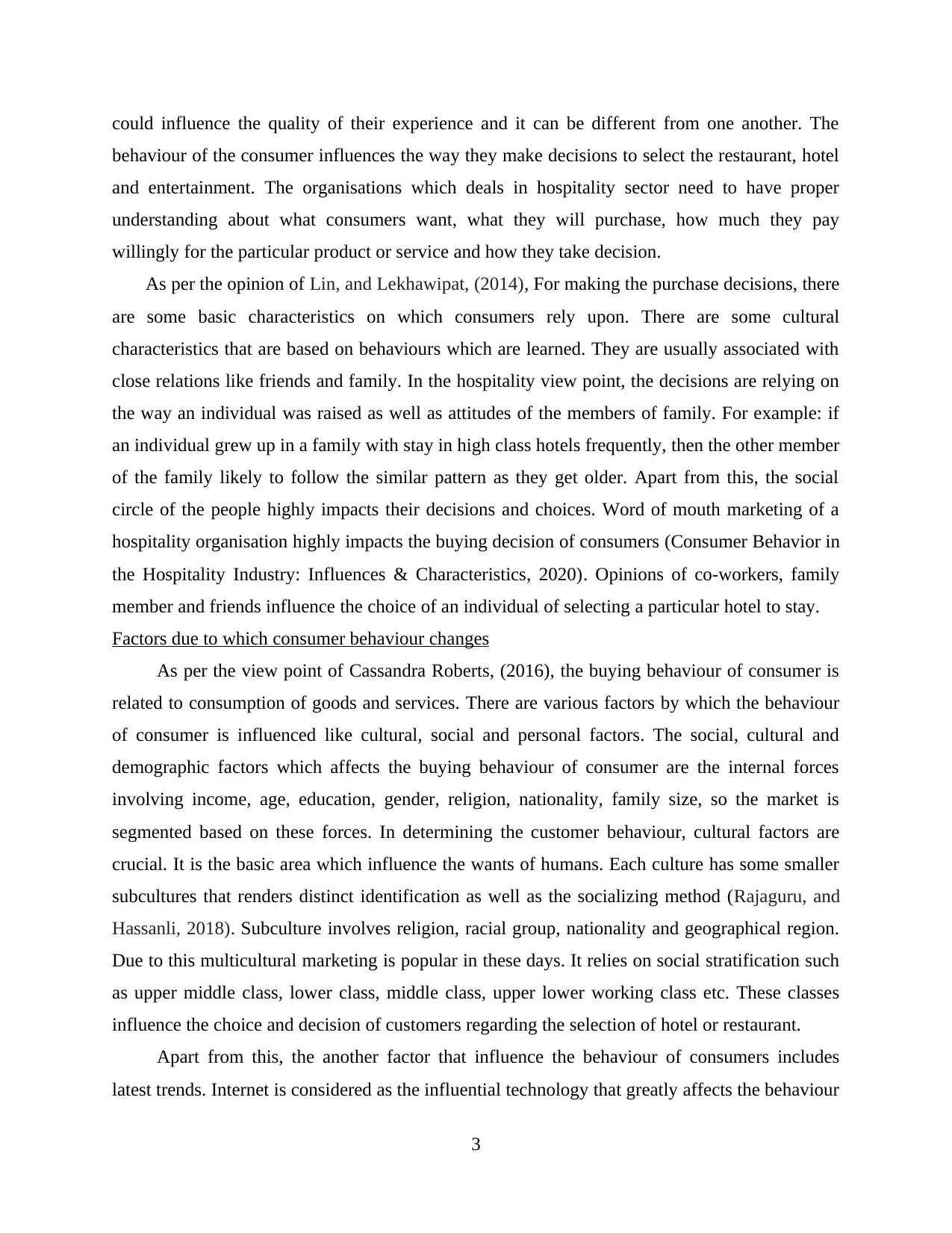
could influence the quality of their experience and it can be different from one another. The
behaviour of the consumer influences the way they make decisions to select the restaurant, hotel
and entertainment. The organisations which deals in hospitality sector need to have proper
understanding about what consumers want, what they will purchase, how much they pay
willingly for the particular product or service and how they take decision.
As per the opinion of Lin, and Lekhawipat, (2014), For making the purchase decisions, there
are some basic characteristics on which consumers rely upon. There are some cultural
characteristics that are based on behaviours which are learned. They are usually associated with
close relations like friends and family. In the hospitality view point, the decisions are relying on
the way an individual was raised as well as attitudes of the members of family. For example: if
an individual grew up in a family with stay in high class hotels frequently, then the other member
of the family likely to follow the similar pattern as they get older. Apart from this, the social
circle of the people highly impacts their decisions and choices. Word of mouth marketing of a
hospitality organisation highly impacts the buying decision of consumers (Consumer Behavior in
the Hospitality Industry: Influences & Characteristics, 2020). Opinions of co-workers, family
member and friends influence the choice of an individual of selecting a particular hotel to stay.
Factors due to which consumer behaviour changes
As per the view point of Cassandra Roberts, (2016), the buying behaviour of consumer is
related to consumption of goods and services. There are various factors by which the behaviour
of consumer is influenced like cultural, social and personal factors. The social, cultural and
demographic factors which affects the buying behaviour of consumer are the internal forces
involving income, age, education, gender, religion, nationality, family size, so the market is
segmented based on these forces. In determining the customer behaviour, cultural factors are
crucial. It is the basic area which influence the wants of humans. Each culture has some smaller
subcultures that renders distinct identification as well as the socializing method (Rajaguru, and
Hassanli, 2018). Subculture involves religion, racial group, nationality and geographical region.
Due to this multicultural marketing is popular in these days. It relies on social stratification such
as upper middle class, lower class, middle class, upper lower working class etc. These classes
influence the choice and decision of customers regarding the selection of hotel or restaurant.
Apart from this, the another factor that influence the behaviour of consumers includes
latest trends. Internet is considered as the influential technology that greatly affects the behaviour
3
behaviour of the consumer influences the way they make decisions to select the restaurant, hotel
and entertainment. The organisations which deals in hospitality sector need to have proper
understanding about what consumers want, what they will purchase, how much they pay
willingly for the particular product or service and how they take decision.
As per the opinion of Lin, and Lekhawipat, (2014), For making the purchase decisions, there
are some basic characteristics on which consumers rely upon. There are some cultural
characteristics that are based on behaviours which are learned. They are usually associated with
close relations like friends and family. In the hospitality view point, the decisions are relying on
the way an individual was raised as well as attitudes of the members of family. For example: if
an individual grew up in a family with stay in high class hotels frequently, then the other member
of the family likely to follow the similar pattern as they get older. Apart from this, the social
circle of the people highly impacts their decisions and choices. Word of mouth marketing of a
hospitality organisation highly impacts the buying decision of consumers (Consumer Behavior in
the Hospitality Industry: Influences & Characteristics, 2020). Opinions of co-workers, family
member and friends influence the choice of an individual of selecting a particular hotel to stay.
Factors due to which consumer behaviour changes
As per the view point of Cassandra Roberts, (2016), the buying behaviour of consumer is
related to consumption of goods and services. There are various factors by which the behaviour
of consumer is influenced like cultural, social and personal factors. The social, cultural and
demographic factors which affects the buying behaviour of consumer are the internal forces
involving income, age, education, gender, religion, nationality, family size, so the market is
segmented based on these forces. In determining the customer behaviour, cultural factors are
crucial. It is the basic area which influence the wants of humans. Each culture has some smaller
subcultures that renders distinct identification as well as the socializing method (Rajaguru, and
Hassanli, 2018). Subculture involves religion, racial group, nationality and geographical region.
Due to this multicultural marketing is popular in these days. It relies on social stratification such
as upper middle class, lower class, middle class, upper lower working class etc. These classes
influence the choice and decision of customers regarding the selection of hotel or restaurant.
Apart from this, the another factor that influence the behaviour of consumers includes
latest trends. Internet is considered as the influential technology that greatly affects the behaviour
3
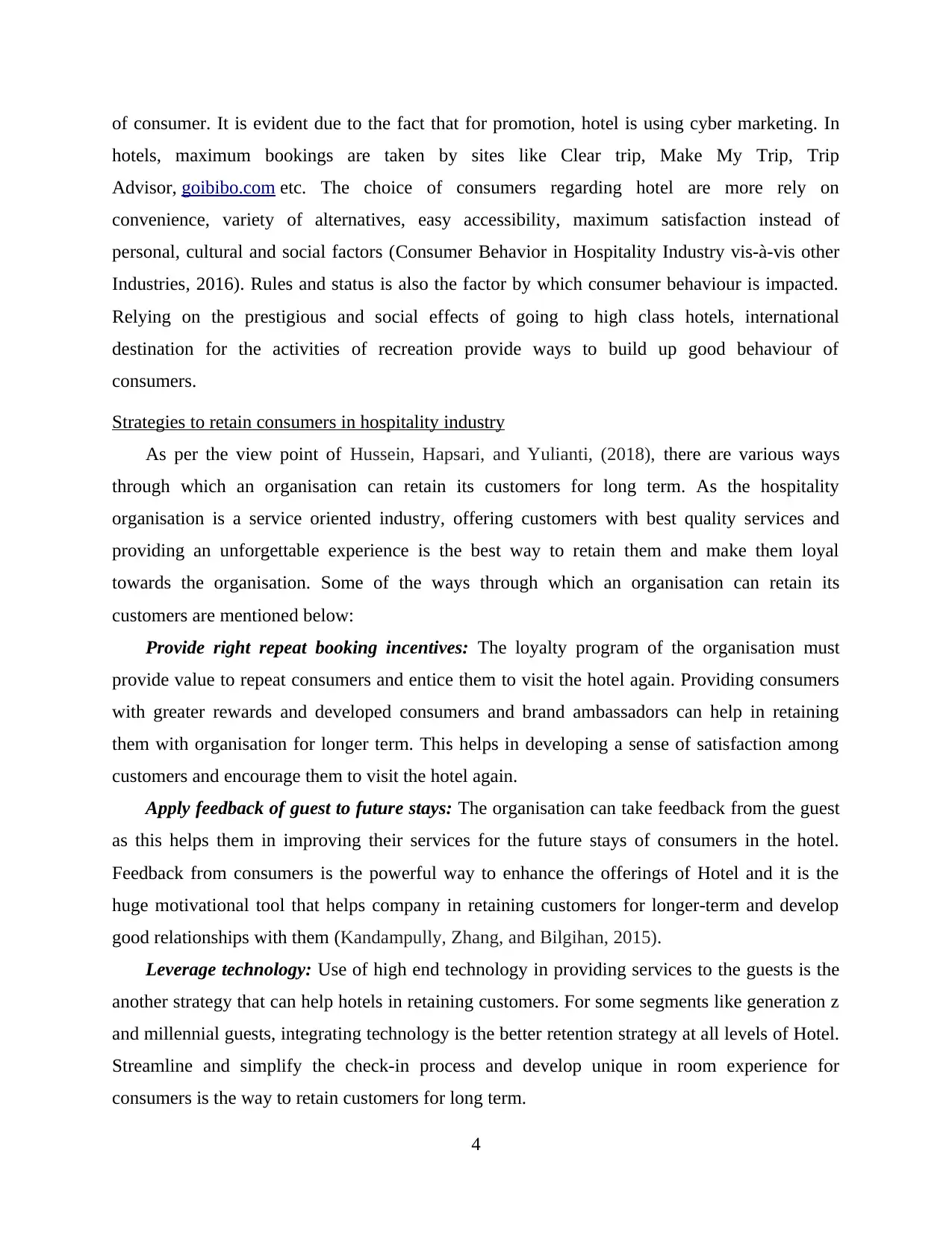
of consumer. It is evident due to the fact that for promotion, hotel is using cyber marketing. In
hotels, maximum bookings are taken by sites like Clear trip, Make My Trip, Trip
Advisor, goibibo.com etc. The choice of consumers regarding hotel are more rely on
convenience, variety of alternatives, easy accessibility, maximum satisfaction instead of
personal, cultural and social factors (Consumer Behavior in Hospitality Industry vis-à-vis other
Industries, 2016). Rules and status is also the factor by which consumer behaviour is impacted.
Relying on the prestigious and social effects of going to high class hotels, international
destination for the activities of recreation provide ways to build up good behaviour of
consumers.
Strategies to retain consumers in hospitality industry
As per the view point of Hussein, Hapsari, and Yulianti, (2018), there are various ways
through which an organisation can retain its customers for long term. As the hospitality
organisation is a service oriented industry, offering customers with best quality services and
providing an unforgettable experience is the best way to retain them and make them loyal
towards the organisation. Some of the ways through which an organisation can retain its
customers are mentioned below:
Provide right repeat booking incentives: The loyalty program of the organisation must
provide value to repeat consumers and entice them to visit the hotel again. Providing consumers
with greater rewards and developed consumers and brand ambassadors can help in retaining
them with organisation for longer term. This helps in developing a sense of satisfaction among
customers and encourage them to visit the hotel again.
Apply feedback of guest to future stays: The organisation can take feedback from the guest
as this helps them in improving their services for the future stays of consumers in the hotel.
Feedback from consumers is the powerful way to enhance the offerings of Hotel and it is the
huge motivational tool that helps company in retaining customers for longer-term and develop
good relationships with them (Kandampully, Zhang, and Bilgihan, 2015).
Leverage technology: Use of high end technology in providing services to the guests is the
another strategy that can help hotels in retaining customers. For some segments like generation z
and millennial guests, integrating technology is the better retention strategy at all levels of Hotel.
Streamline and simplify the check-in process and develop unique in room experience for
consumers is the way to retain customers for long term.
4
hotels, maximum bookings are taken by sites like Clear trip, Make My Trip, Trip
Advisor, goibibo.com etc. The choice of consumers regarding hotel are more rely on
convenience, variety of alternatives, easy accessibility, maximum satisfaction instead of
personal, cultural and social factors (Consumer Behavior in Hospitality Industry vis-à-vis other
Industries, 2016). Rules and status is also the factor by which consumer behaviour is impacted.
Relying on the prestigious and social effects of going to high class hotels, international
destination for the activities of recreation provide ways to build up good behaviour of
consumers.
Strategies to retain consumers in hospitality industry
As per the view point of Hussein, Hapsari, and Yulianti, (2018), there are various ways
through which an organisation can retain its customers for long term. As the hospitality
organisation is a service oriented industry, offering customers with best quality services and
providing an unforgettable experience is the best way to retain them and make them loyal
towards the organisation. Some of the ways through which an organisation can retain its
customers are mentioned below:
Provide right repeat booking incentives: The loyalty program of the organisation must
provide value to repeat consumers and entice them to visit the hotel again. Providing consumers
with greater rewards and developed consumers and brand ambassadors can help in retaining
them with organisation for longer term. This helps in developing a sense of satisfaction among
customers and encourage them to visit the hotel again.
Apply feedback of guest to future stays: The organisation can take feedback from the guest
as this helps them in improving their services for the future stays of consumers in the hotel.
Feedback from consumers is the powerful way to enhance the offerings of Hotel and it is the
huge motivational tool that helps company in retaining customers for longer-term and develop
good relationships with them (Kandampully, Zhang, and Bilgihan, 2015).
Leverage technology: Use of high end technology in providing services to the guests is the
another strategy that can help hotels in retaining customers. For some segments like generation z
and millennial guests, integrating technology is the better retention strategy at all levels of Hotel.
Streamline and simplify the check-in process and develop unique in room experience for
consumers is the way to retain customers for long term.
4
Paraphrase This Document
Need a fresh take? Get an instant paraphrase of this document with our AI Paraphraser
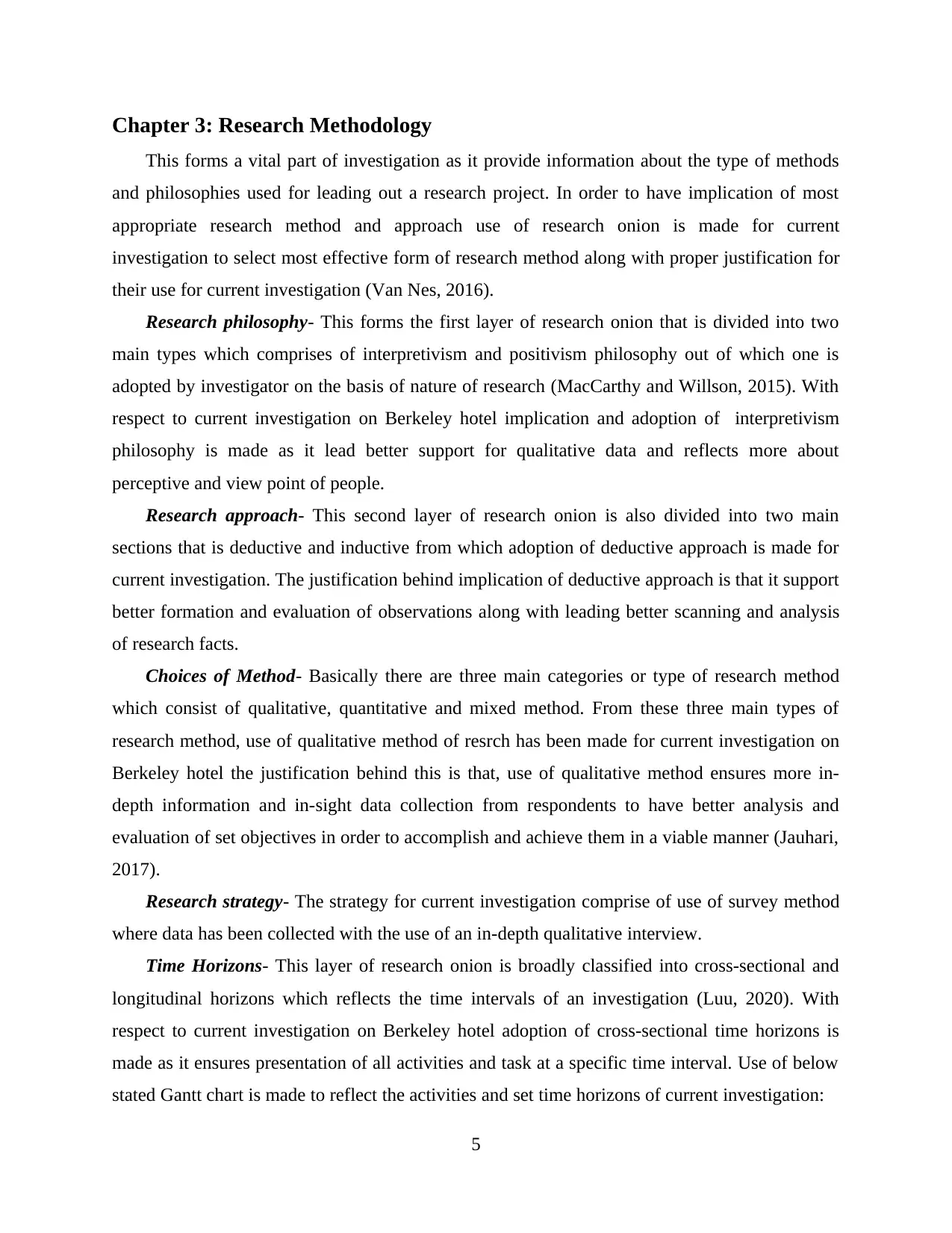
Chapter 3: Research Methodology
This forms a vital part of investigation as it provide information about the type of methods
and philosophies used for leading out a research project. In order to have implication of most
appropriate research method and approach use of research onion is made for current
investigation to select most effective form of research method along with proper justification for
their use for current investigation (Van Nes, 2016).
Research philosophy- This forms the first layer of research onion that is divided into two
main types which comprises of interpretivism and positivism philosophy out of which one is
adopted by investigator on the basis of nature of research (MacCarthy and Willson, 2015). With
respect to current investigation on Berkeley hotel implication and adoption of interpretivism
philosophy is made as it lead better support for qualitative data and reflects more about
perceptive and view point of people.
Research approach- This second layer of research onion is also divided into two main
sections that is deductive and inductive from which adoption of deductive approach is made for
current investigation. The justification behind implication of deductive approach is that it support
better formation and evaluation of observations along with leading better scanning and analysis
of research facts.
Choices of Method- Basically there are three main categories or type of research method
which consist of qualitative, quantitative and mixed method. From these three main types of
research method, use of qualitative method of resrch has been made for current investigation on
Berkeley hotel the justification behind this is that, use of qualitative method ensures more in-
depth information and in-sight data collection from respondents to have better analysis and
evaluation of set objectives in order to accomplish and achieve them in a viable manner (Jauhari,
2017).
Research strategy- The strategy for current investigation comprise of use of survey method
where data has been collected with the use of an in-depth qualitative interview.
Time Horizons- This layer of research onion is broadly classified into cross-sectional and
longitudinal horizons which reflects the time intervals of an investigation (Luu, 2020). With
respect to current investigation on Berkeley hotel adoption of cross-sectional time horizons is
made as it ensures presentation of all activities and task at a specific time interval. Use of below
stated Gantt chart is made to reflect the activities and set time horizons of current investigation:
5
This forms a vital part of investigation as it provide information about the type of methods
and philosophies used for leading out a research project. In order to have implication of most
appropriate research method and approach use of research onion is made for current
investigation to select most effective form of research method along with proper justification for
their use for current investigation (Van Nes, 2016).
Research philosophy- This forms the first layer of research onion that is divided into two
main types which comprises of interpretivism and positivism philosophy out of which one is
adopted by investigator on the basis of nature of research (MacCarthy and Willson, 2015). With
respect to current investigation on Berkeley hotel implication and adoption of interpretivism
philosophy is made as it lead better support for qualitative data and reflects more about
perceptive and view point of people.
Research approach- This second layer of research onion is also divided into two main
sections that is deductive and inductive from which adoption of deductive approach is made for
current investigation. The justification behind implication of deductive approach is that it support
better formation and evaluation of observations along with leading better scanning and analysis
of research facts.
Choices of Method- Basically there are three main categories or type of research method
which consist of qualitative, quantitative and mixed method. From these three main types of
research method, use of qualitative method of resrch has been made for current investigation on
Berkeley hotel the justification behind this is that, use of qualitative method ensures more in-
depth information and in-sight data collection from respondents to have better analysis and
evaluation of set objectives in order to accomplish and achieve them in a viable manner (Jauhari,
2017).
Research strategy- The strategy for current investigation comprise of use of survey method
where data has been collected with the use of an in-depth qualitative interview.
Time Horizons- This layer of research onion is broadly classified into cross-sectional and
longitudinal horizons which reflects the time intervals of an investigation (Luu, 2020). With
respect to current investigation on Berkeley hotel adoption of cross-sectional time horizons is
made as it ensures presentation of all activities and task at a specific time interval. Use of below
stated Gantt chart is made to reflect the activities and set time horizons of current investigation:
5
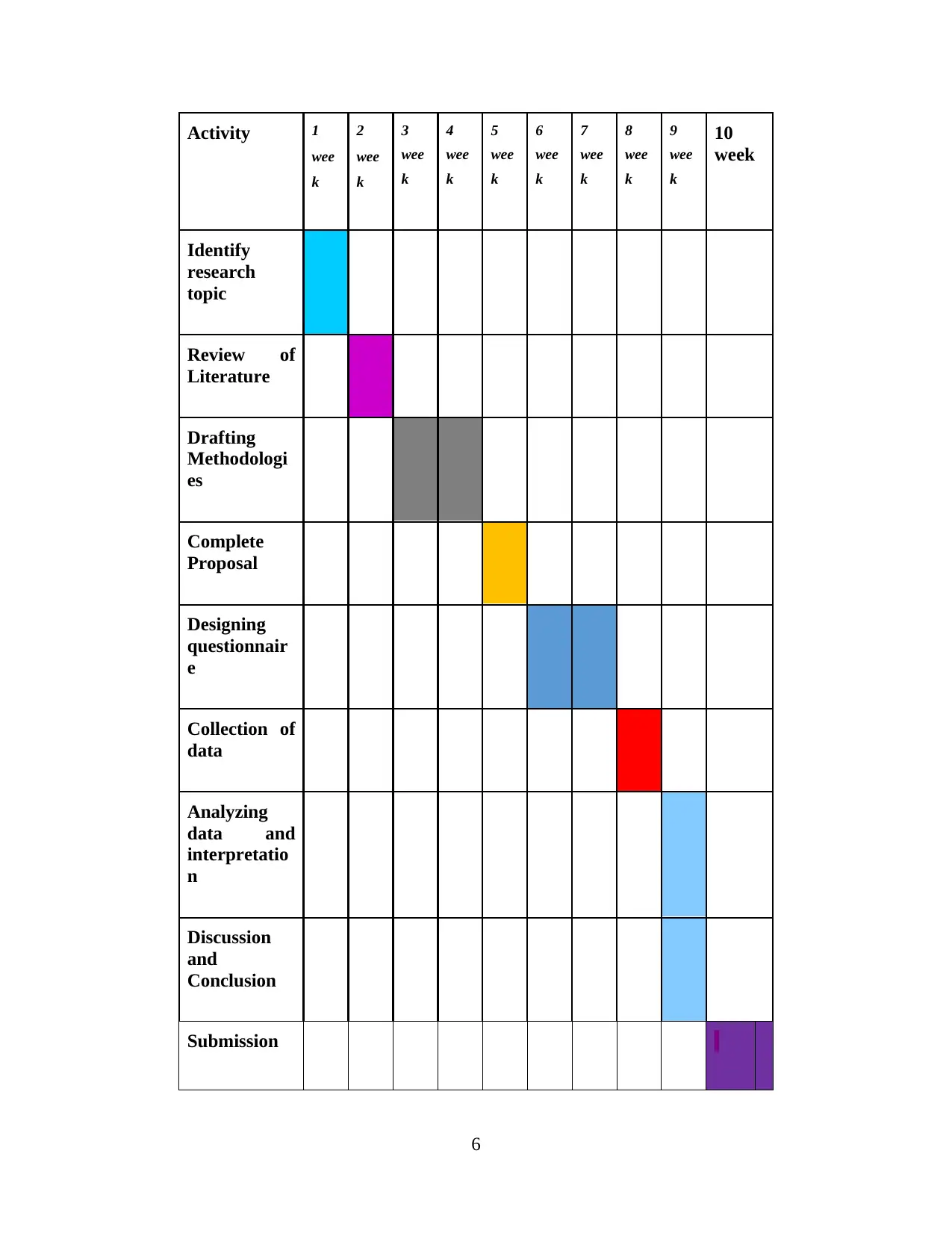
Activity 1
wee
k
2
wee
k
3
wee
k
4
wee
k
5
wee
k
6
wee
k
7
wee
k
8
wee
k
9
wee
k
10
week
Identify
research
topic
Review of
Literature
Drafting
Methodologi
es
Complete
Proposal
Designing
questionnair
e
Collection of
data
Analyzing
data and
interpretatio
n
Discussion
and
Conclusion
Submission
6
wee
k
2
wee
k
3
wee
k
4
wee
k
5
wee
k
6
wee
k
7
wee
k
8
wee
k
9
wee
k
10
week
Identify
research
topic
Review of
Literature
Drafting
Methodologi
es
Complete
Proposal
Designing
questionnair
e
Collection of
data
Analyzing
data and
interpretatio
n
Discussion
and
Conclusion
Submission
6
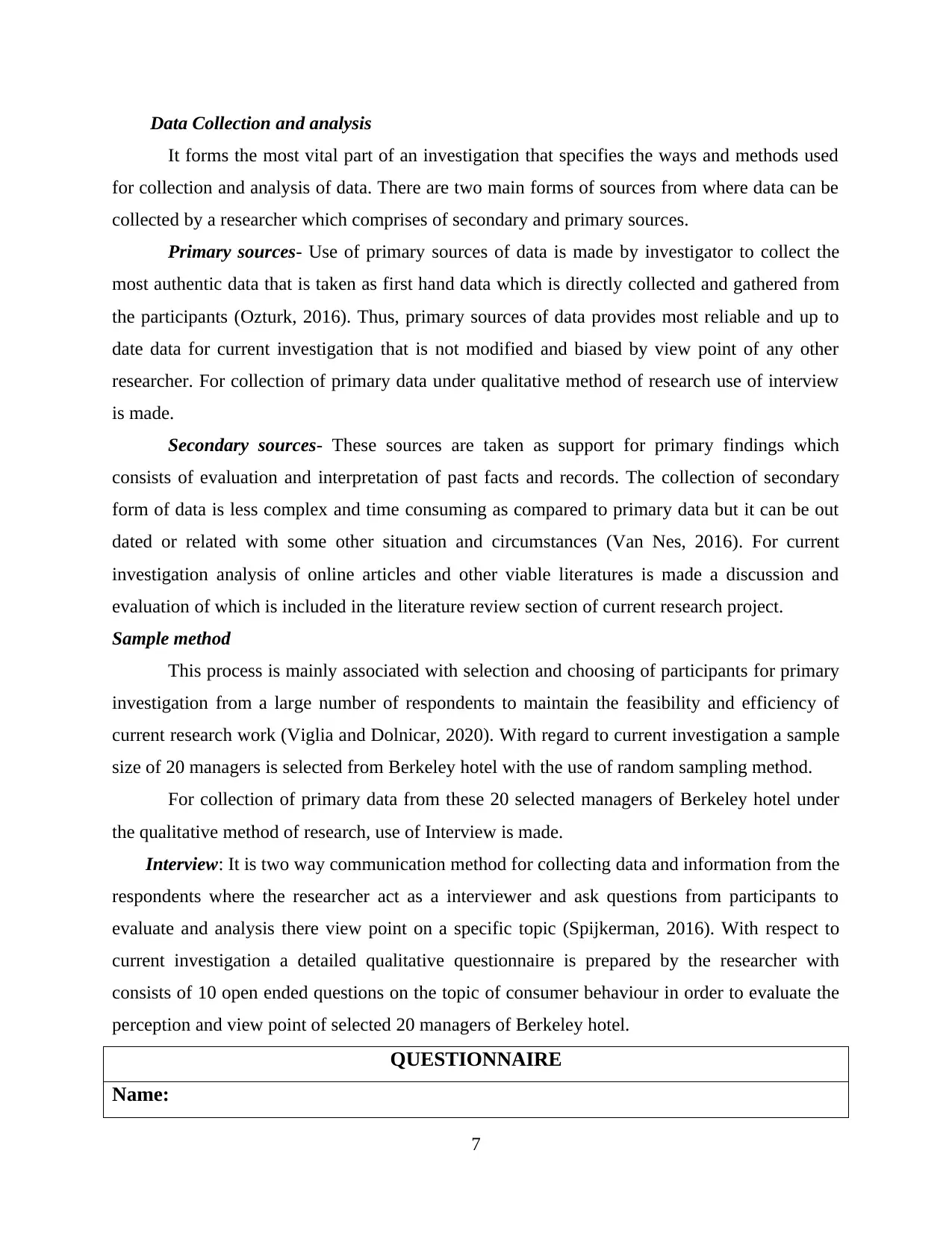
Data Collection and analysis
It forms the most vital part of an investigation that specifies the ways and methods used
for collection and analysis of data. There are two main forms of sources from where data can be
collected by a researcher which comprises of secondary and primary sources.
Primary sources- Use of primary sources of data is made by investigator to collect the
most authentic data that is taken as first hand data which is directly collected and gathered from
the participants (Ozturk, 2016). Thus, primary sources of data provides most reliable and up to
date data for current investigation that is not modified and biased by view point of any other
researcher. For collection of primary data under qualitative method of research use of interview
is made.
Secondary sources- These sources are taken as support for primary findings which
consists of evaluation and interpretation of past facts and records. The collection of secondary
form of data is less complex and time consuming as compared to primary data but it can be out
dated or related with some other situation and circumstances (Van Nes, 2016). For current
investigation analysis of online articles and other viable literatures is made a discussion and
evaluation of which is included in the literature review section of current research project.
Sample method
This process is mainly associated with selection and choosing of participants for primary
investigation from a large number of respondents to maintain the feasibility and efficiency of
current research work (Viglia and Dolnicar, 2020). With regard to current investigation a sample
size of 20 managers is selected from Berkeley hotel with the use of random sampling method.
For collection of primary data from these 20 selected managers of Berkeley hotel under
the qualitative method of research, use of Interview is made.
Interview: It is two way communication method for collecting data and information from the
respondents where the researcher act as a interviewer and ask questions from participants to
evaluate and analysis there view point on a specific topic (Spijkerman, 2016). With respect to
current investigation a detailed qualitative questionnaire is prepared by the researcher with
consists of 10 open ended questions on the topic of consumer behaviour in order to evaluate the
perception and view point of selected 20 managers of Berkeley hotel.
QUESTIONNAIRE
Name:
7
It forms the most vital part of an investigation that specifies the ways and methods used
for collection and analysis of data. There are two main forms of sources from where data can be
collected by a researcher which comprises of secondary and primary sources.
Primary sources- Use of primary sources of data is made by investigator to collect the
most authentic data that is taken as first hand data which is directly collected and gathered from
the participants (Ozturk, 2016). Thus, primary sources of data provides most reliable and up to
date data for current investigation that is not modified and biased by view point of any other
researcher. For collection of primary data under qualitative method of research use of interview
is made.
Secondary sources- These sources are taken as support for primary findings which
consists of evaluation and interpretation of past facts and records. The collection of secondary
form of data is less complex and time consuming as compared to primary data but it can be out
dated or related with some other situation and circumstances (Van Nes, 2016). For current
investigation analysis of online articles and other viable literatures is made a discussion and
evaluation of which is included in the literature review section of current research project.
Sample method
This process is mainly associated with selection and choosing of participants for primary
investigation from a large number of respondents to maintain the feasibility and efficiency of
current research work (Viglia and Dolnicar, 2020). With regard to current investigation a sample
size of 20 managers is selected from Berkeley hotel with the use of random sampling method.
For collection of primary data from these 20 selected managers of Berkeley hotel under
the qualitative method of research, use of Interview is made.
Interview: It is two way communication method for collecting data and information from the
respondents where the researcher act as a interviewer and ask questions from participants to
evaluate and analysis there view point on a specific topic (Spijkerman, 2016). With respect to
current investigation a detailed qualitative questionnaire is prepared by the researcher with
consists of 10 open ended questions on the topic of consumer behaviour in order to evaluate the
perception and view point of selected 20 managers of Berkeley hotel.
QUESTIONNAIRE
Name:
7
Secure Best Marks with AI Grader
Need help grading? Try our AI Grader for instant feedback on your assignments.
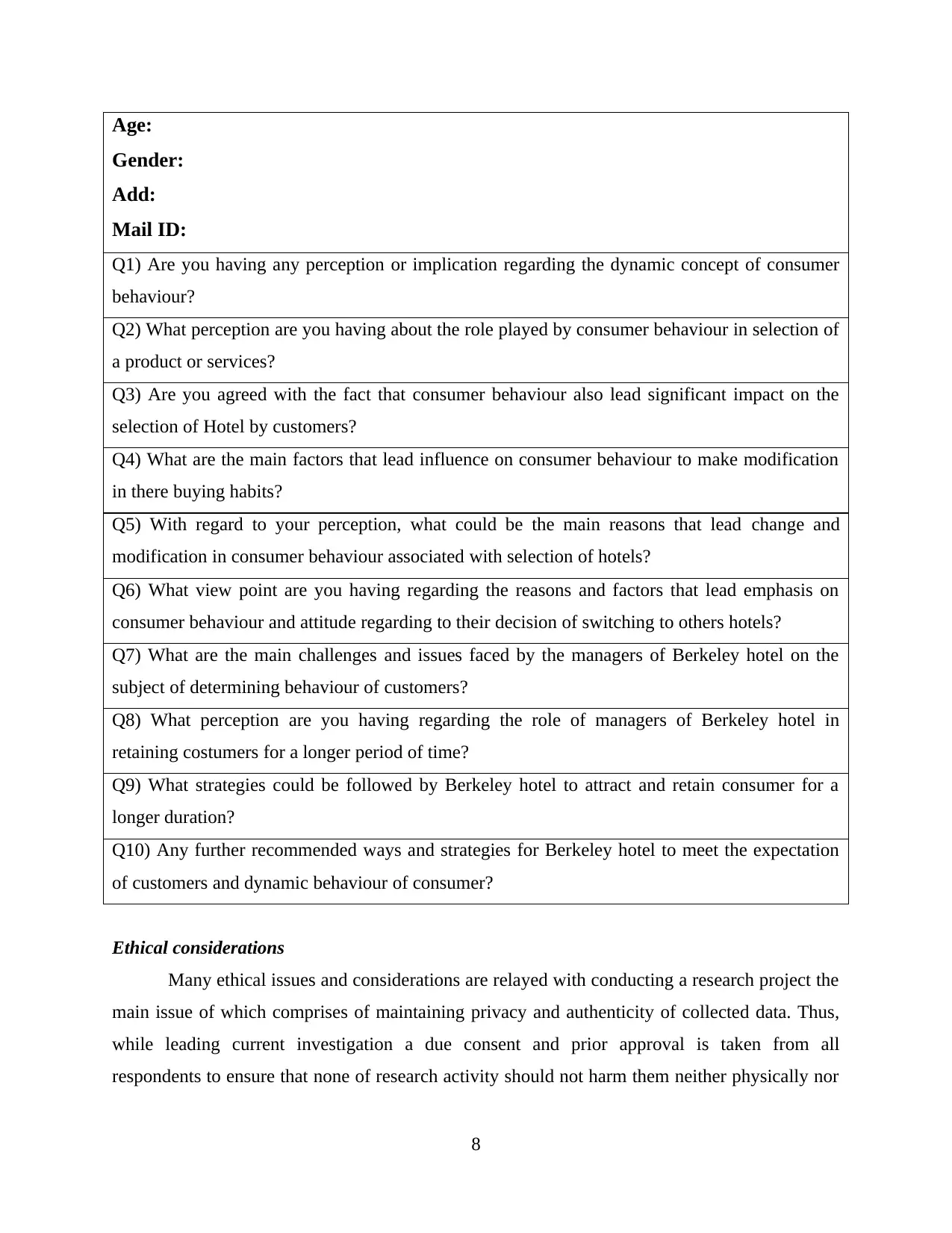
Age:
Gender:
Add:
Mail ID:
Q1) Are you having any perception or implication regarding the dynamic concept of consumer
behaviour?
Q2) What perception are you having about the role played by consumer behaviour in selection of
a product or services?
Q3) Are you agreed with the fact that consumer behaviour also lead significant impact on the
selection of Hotel by customers?
Q4) What are the main factors that lead influence on consumer behaviour to make modification
in there buying habits?
Q5) With regard to your perception, what could be the main reasons that lead change and
modification in consumer behaviour associated with selection of hotels?
Q6) What view point are you having regarding the reasons and factors that lead emphasis on
consumer behaviour and attitude regarding to their decision of switching to others hotels?
Q7) What are the main challenges and issues faced by the managers of Berkeley hotel on the
subject of determining behaviour of customers?
Q8) What perception are you having regarding the role of managers of Berkeley hotel in
retaining costumers for a longer period of time?
Q9) What strategies could be followed by Berkeley hotel to attract and retain consumer for a
longer duration?
Q10) Any further recommended ways and strategies for Berkeley hotel to meet the expectation
of customers and dynamic behaviour of consumer?
Ethical considerations
Many ethical issues and considerations are relayed with conducting a research project the
main issue of which comprises of maintaining privacy and authenticity of collected data. Thus,
while leading current investigation a due consent and prior approval is taken from all
respondents to ensure that none of research activity should not harm them neither physically nor
8
Gender:
Add:
Mail ID:
Q1) Are you having any perception or implication regarding the dynamic concept of consumer
behaviour?
Q2) What perception are you having about the role played by consumer behaviour in selection of
a product or services?
Q3) Are you agreed with the fact that consumer behaviour also lead significant impact on the
selection of Hotel by customers?
Q4) What are the main factors that lead influence on consumer behaviour to make modification
in there buying habits?
Q5) With regard to your perception, what could be the main reasons that lead change and
modification in consumer behaviour associated with selection of hotels?
Q6) What view point are you having regarding the reasons and factors that lead emphasis on
consumer behaviour and attitude regarding to their decision of switching to others hotels?
Q7) What are the main challenges and issues faced by the managers of Berkeley hotel on the
subject of determining behaviour of customers?
Q8) What perception are you having regarding the role of managers of Berkeley hotel in
retaining costumers for a longer period of time?
Q9) What strategies could be followed by Berkeley hotel to attract and retain consumer for a
longer duration?
Q10) Any further recommended ways and strategies for Berkeley hotel to meet the expectation
of customers and dynamic behaviour of consumer?
Ethical considerations
Many ethical issues and considerations are relayed with conducting a research project the
main issue of which comprises of maintaining privacy and authenticity of collected data. Thus,
while leading current investigation a due consent and prior approval is taken from all
respondents to ensure that none of research activity should not harm them neither physically nor
8
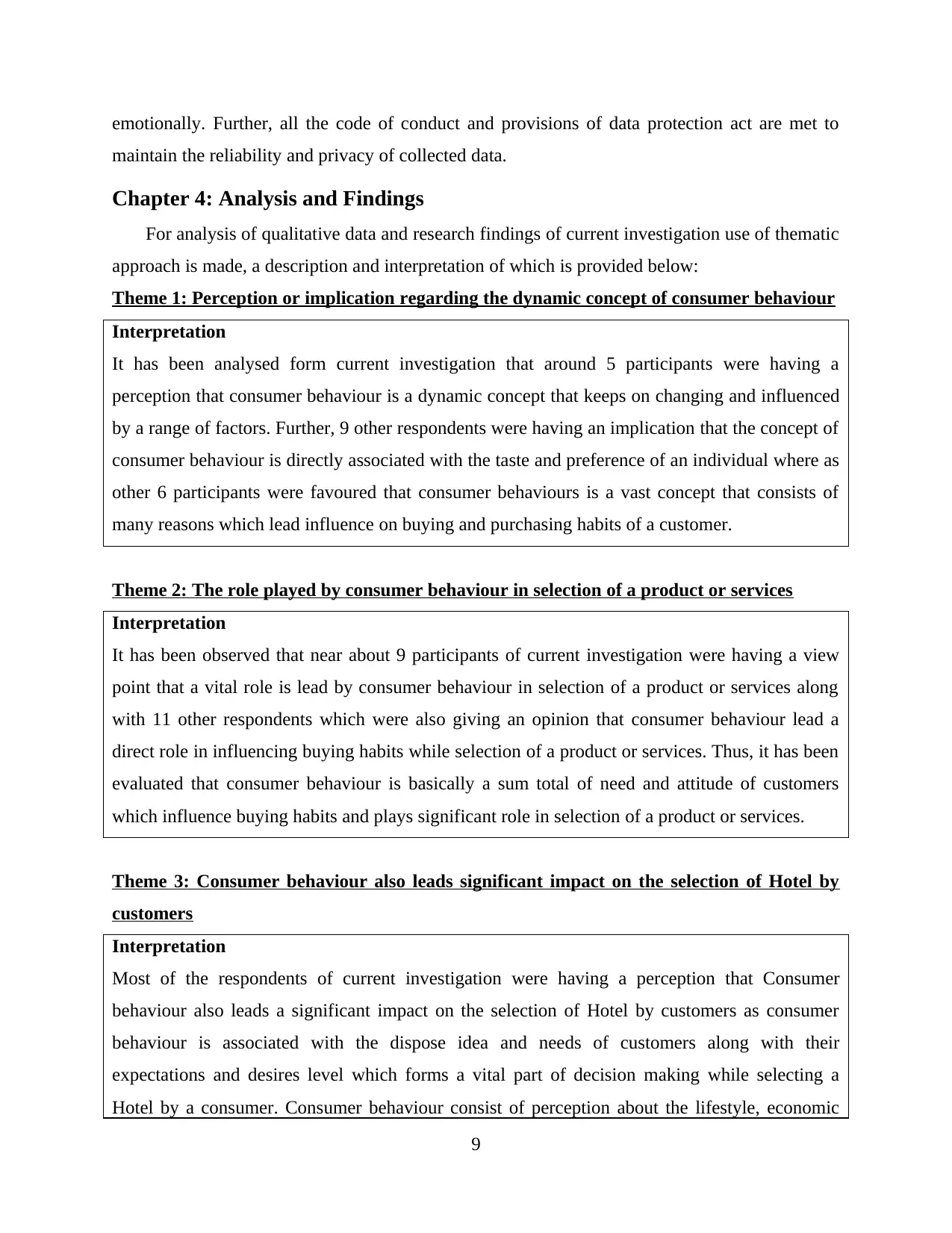
emotionally. Further, all the code of conduct and provisions of data protection act are met to
maintain the reliability and privacy of collected data.
Chapter 4: Analysis and Findings
For analysis of qualitative data and research findings of current investigation use of thematic
approach is made, a description and interpretation of which is provided below:
Theme 1: Perception or implication regarding the dynamic concept of consumer behaviour
Interpretation
It has been analysed form current investigation that around 5 participants were having a
perception that consumer behaviour is a dynamic concept that keeps on changing and influenced
by a range of factors. Further, 9 other respondents were having an implication that the concept of
consumer behaviour is directly associated with the taste and preference of an individual where as
other 6 participants were favoured that consumer behaviours is a vast concept that consists of
many reasons which lead influence on buying and purchasing habits of a customer.
Theme 2: The role played by consumer behaviour in selection of a product or services
Interpretation
It has been observed that near about 9 participants of current investigation were having a view
point that a vital role is lead by consumer behaviour in selection of a product or services along
with 11 other respondents which were also giving an opinion that consumer behaviour lead a
direct role in influencing buying habits while selection of a product or services. Thus, it has been
evaluated that consumer behaviour is basically a sum total of need and attitude of customers
which influence buying habits and plays significant role in selection of a product or services.
Theme 3: Consumer behaviour also leads significant impact on the selection of Hotel by
customers
Interpretation
Most of the respondents of current investigation were having a perception that Consumer
behaviour also leads a significant impact on the selection of Hotel by customers as consumer
behaviour is associated with the dispose idea and needs of customers along with their
expectations and desires level which forms a vital part of decision making while selecting a
Hotel by a consumer. Consumer behaviour consist of perception about the lifestyle, economic
9
maintain the reliability and privacy of collected data.
Chapter 4: Analysis and Findings
For analysis of qualitative data and research findings of current investigation use of thematic
approach is made, a description and interpretation of which is provided below:
Theme 1: Perception or implication regarding the dynamic concept of consumer behaviour
Interpretation
It has been analysed form current investigation that around 5 participants were having a
perception that consumer behaviour is a dynamic concept that keeps on changing and influenced
by a range of factors. Further, 9 other respondents were having an implication that the concept of
consumer behaviour is directly associated with the taste and preference of an individual where as
other 6 participants were favoured that consumer behaviours is a vast concept that consists of
many reasons which lead influence on buying and purchasing habits of a customer.
Theme 2: The role played by consumer behaviour in selection of a product or services
Interpretation
It has been observed that near about 9 participants of current investigation were having a view
point that a vital role is lead by consumer behaviour in selection of a product or services along
with 11 other respondents which were also giving an opinion that consumer behaviour lead a
direct role in influencing buying habits while selection of a product or services. Thus, it has been
evaluated that consumer behaviour is basically a sum total of need and attitude of customers
which influence buying habits and plays significant role in selection of a product or services.
Theme 3: Consumer behaviour also leads significant impact on the selection of Hotel by
customers
Interpretation
Most of the respondents of current investigation were having a perception that Consumer
behaviour also leads a significant impact on the selection of Hotel by customers as consumer
behaviour is associated with the dispose idea and needs of customers along with their
expectations and desires level which forms a vital part of decision making while selecting a
Hotel by a consumer. Consumer behaviour consist of perception about the lifestyle, economic
9
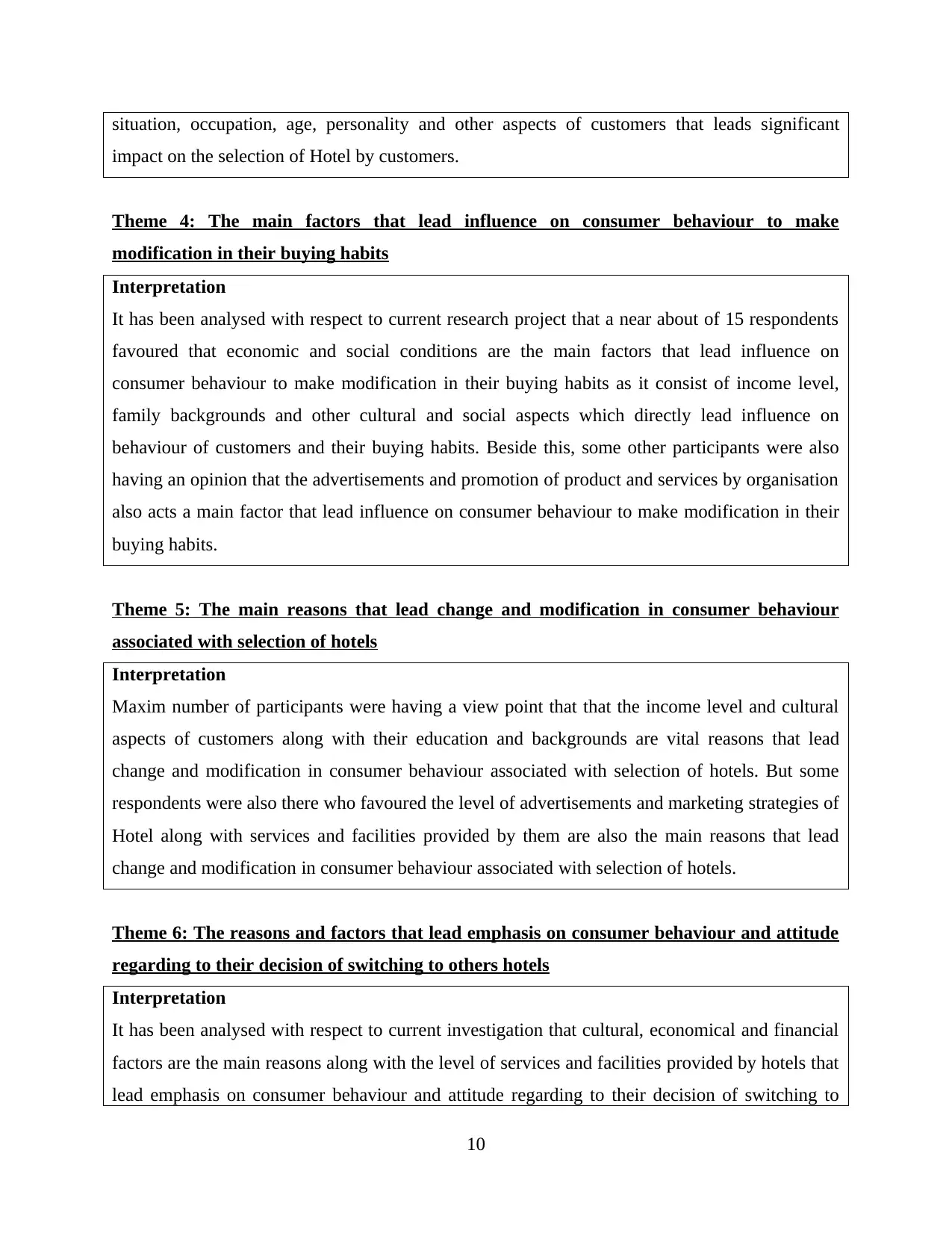
situation, occupation, age, personality and other aspects of customers that leads significant
impact on the selection of Hotel by customers.
Theme 4: The main factors that lead influence on consumer behaviour to make
modification in their buying habits
Interpretation
It has been analysed with respect to current research project that a near about of 15 respondents
favoured that economic and social conditions are the main factors that lead influence on
consumer behaviour to make modification in their buying habits as it consist of income level,
family backgrounds and other cultural and social aspects which directly lead influence on
behaviour of customers and their buying habits. Beside this, some other participants were also
having an opinion that the advertisements and promotion of product and services by organisation
also acts a main factor that lead influence on consumer behaviour to make modification in their
buying habits.
Theme 5: The main reasons that lead change and modification in consumer behaviour
associated with selection of hotels
Interpretation
Maxim number of participants were having a view point that that the income level and cultural
aspects of customers along with their education and backgrounds are vital reasons that lead
change and modification in consumer behaviour associated with selection of hotels. But some
respondents were also there who favoured the level of advertisements and marketing strategies of
Hotel along with services and facilities provided by them are also the main reasons that lead
change and modification in consumer behaviour associated with selection of hotels.
Theme 6: The reasons and factors that lead emphasis on consumer behaviour and attitude
regarding to their decision of switching to others hotels
Interpretation
It has been analysed with respect to current investigation that cultural, economical and financial
factors are the main reasons along with the level of services and facilities provided by hotels that
lead emphasis on consumer behaviour and attitude regarding to their decision of switching to
10
impact on the selection of Hotel by customers.
Theme 4: The main factors that lead influence on consumer behaviour to make
modification in their buying habits
Interpretation
It has been analysed with respect to current research project that a near about of 15 respondents
favoured that economic and social conditions are the main factors that lead influence on
consumer behaviour to make modification in their buying habits as it consist of income level,
family backgrounds and other cultural and social aspects which directly lead influence on
behaviour of customers and their buying habits. Beside this, some other participants were also
having an opinion that the advertisements and promotion of product and services by organisation
also acts a main factor that lead influence on consumer behaviour to make modification in their
buying habits.
Theme 5: The main reasons that lead change and modification in consumer behaviour
associated with selection of hotels
Interpretation
Maxim number of participants were having a view point that that the income level and cultural
aspects of customers along with their education and backgrounds are vital reasons that lead
change and modification in consumer behaviour associated with selection of hotels. But some
respondents were also there who favoured the level of advertisements and marketing strategies of
Hotel along with services and facilities provided by them are also the main reasons that lead
change and modification in consumer behaviour associated with selection of hotels.
Theme 6: The reasons and factors that lead emphasis on consumer behaviour and attitude
regarding to their decision of switching to others hotels
Interpretation
It has been analysed with respect to current investigation that cultural, economical and financial
factors are the main reasons along with the level of services and facilities provided by hotels that
lead emphasis on consumer behaviour and attitude regarding to their decision of switching to
10
Paraphrase This Document
Need a fresh take? Get an instant paraphrase of this document with our AI Paraphraser
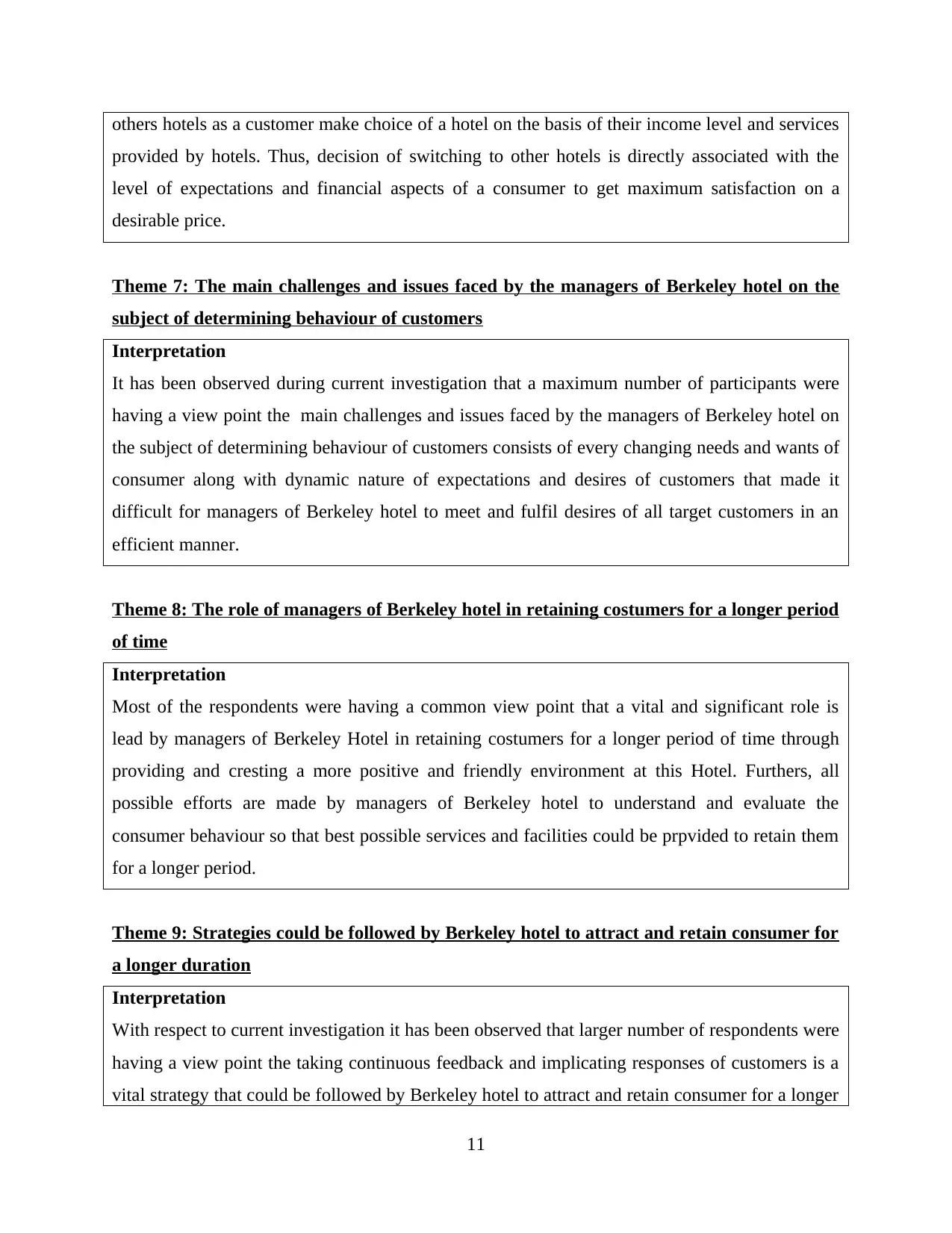
others hotels as a customer make choice of a hotel on the basis of their income level and services
provided by hotels. Thus, decision of switching to other hotels is directly associated with the
level of expectations and financial aspects of a consumer to get maximum satisfaction on a
desirable price.
Theme 7: The main challenges and issues faced by the managers of Berkeley hotel on the
subject of determining behaviour of customers
Interpretation
It has been observed during current investigation that a maximum number of participants were
having a view point the main challenges and issues faced by the managers of Berkeley hotel on
the subject of determining behaviour of customers consists of every changing needs and wants of
consumer along with dynamic nature of expectations and desires of customers that made it
difficult for managers of Berkeley hotel to meet and fulfil desires of all target customers in an
efficient manner.
Theme 8: The role of managers of Berkeley hotel in retaining costumers for a longer period
of time
Interpretation
Most of the respondents were having a common view point that a vital and significant role is
lead by managers of Berkeley Hotel in retaining costumers for a longer period of time through
providing and cresting a more positive and friendly environment at this Hotel. Furthers, all
possible efforts are made by managers of Berkeley hotel to understand and evaluate the
consumer behaviour so that best possible services and facilities could be prpvided to retain them
for a longer period.
Theme 9: Strategies could be followed by Berkeley hotel to attract and retain consumer for
a longer duration
Interpretation
With respect to current investigation it has been observed that larger number of respondents were
having a view point the taking continuous feedback and implicating responses of customers is a
vital strategy that could be followed by Berkeley hotel to attract and retain consumer for a longer
11
provided by hotels. Thus, decision of switching to other hotels is directly associated with the
level of expectations and financial aspects of a consumer to get maximum satisfaction on a
desirable price.
Theme 7: The main challenges and issues faced by the managers of Berkeley hotel on the
subject of determining behaviour of customers
Interpretation
It has been observed during current investigation that a maximum number of participants were
having a view point the main challenges and issues faced by the managers of Berkeley hotel on
the subject of determining behaviour of customers consists of every changing needs and wants of
consumer along with dynamic nature of expectations and desires of customers that made it
difficult for managers of Berkeley hotel to meet and fulfil desires of all target customers in an
efficient manner.
Theme 8: The role of managers of Berkeley hotel in retaining costumers for a longer period
of time
Interpretation
Most of the respondents were having a common view point that a vital and significant role is
lead by managers of Berkeley Hotel in retaining costumers for a longer period of time through
providing and cresting a more positive and friendly environment at this Hotel. Furthers, all
possible efforts are made by managers of Berkeley hotel to understand and evaluate the
consumer behaviour so that best possible services and facilities could be prpvided to retain them
for a longer period.
Theme 9: Strategies could be followed by Berkeley hotel to attract and retain consumer for
a longer duration
Interpretation
With respect to current investigation it has been observed that larger number of respondents were
having a view point the taking continuous feedback and implicating responses of customers is a
vital strategy that could be followed by Berkeley hotel to attract and retain consumer for a longer
11
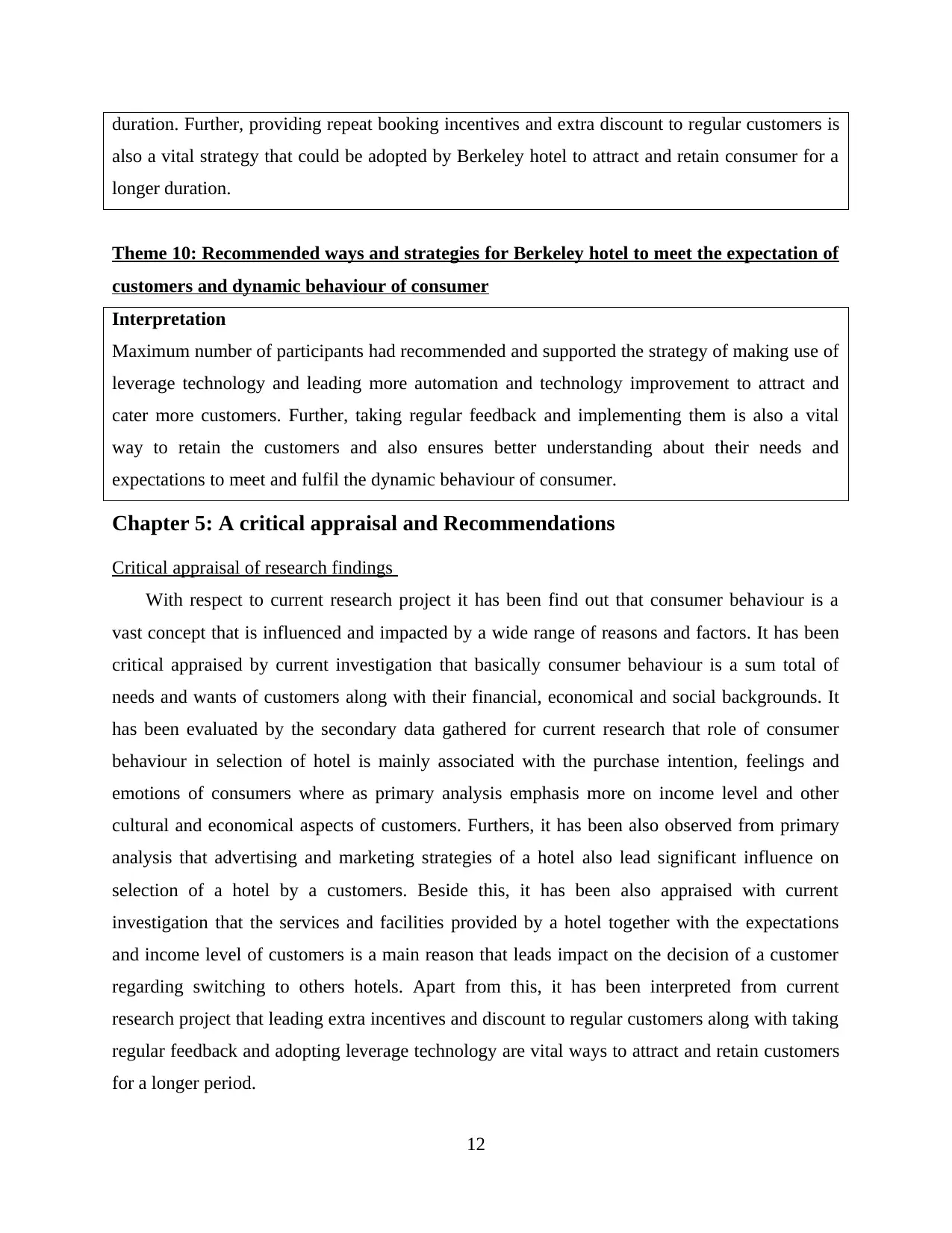
duration. Further, providing repeat booking incentives and extra discount to regular customers is
also a vital strategy that could be adopted by Berkeley hotel to attract and retain consumer for a
longer duration.
Theme 10: Recommended ways and strategies for Berkeley hotel to meet the expectation of
customers and dynamic behaviour of consumer
Interpretation
Maximum number of participants had recommended and supported the strategy of making use of
leverage technology and leading more automation and technology improvement to attract and
cater more customers. Further, taking regular feedback and implementing them is also a vital
way to retain the customers and also ensures better understanding about their needs and
expectations to meet and fulfil the dynamic behaviour of consumer.
Chapter 5: A critical appraisal and Recommendations
Critical appraisal of research findings
With respect to current research project it has been find out that consumer behaviour is a
vast concept that is influenced and impacted by a wide range of reasons and factors. It has been
critical appraised by current investigation that basically consumer behaviour is a sum total of
needs and wants of customers along with their financial, economical and social backgrounds. It
has been evaluated by the secondary data gathered for current research that role of consumer
behaviour in selection of hotel is mainly associated with the purchase intention, feelings and
emotions of consumers where as primary analysis emphasis more on income level and other
cultural and economical aspects of customers. Furthers, it has been also observed from primary
analysis that advertising and marketing strategies of a hotel also lead significant influence on
selection of a hotel by a customers. Beside this, it has been also appraised with current
investigation that the services and facilities provided by a hotel together with the expectations
and income level of customers is a main reason that leads impact on the decision of a customer
regarding switching to others hotels. Apart from this, it has been interpreted from current
research project that leading extra incentives and discount to regular customers along with taking
regular feedback and adopting leverage technology are vital ways to attract and retain customers
for a longer period.
12
also a vital strategy that could be adopted by Berkeley hotel to attract and retain consumer for a
longer duration.
Theme 10: Recommended ways and strategies for Berkeley hotel to meet the expectation of
customers and dynamic behaviour of consumer
Interpretation
Maximum number of participants had recommended and supported the strategy of making use of
leverage technology and leading more automation and technology improvement to attract and
cater more customers. Further, taking regular feedback and implementing them is also a vital
way to retain the customers and also ensures better understanding about their needs and
expectations to meet and fulfil the dynamic behaviour of consumer.
Chapter 5: A critical appraisal and Recommendations
Critical appraisal of research findings
With respect to current research project it has been find out that consumer behaviour is a
vast concept that is influenced and impacted by a wide range of reasons and factors. It has been
critical appraised by current investigation that basically consumer behaviour is a sum total of
needs and wants of customers along with their financial, economical and social backgrounds. It
has been evaluated by the secondary data gathered for current research that role of consumer
behaviour in selection of hotel is mainly associated with the purchase intention, feelings and
emotions of consumers where as primary analysis emphasis more on income level and other
cultural and economical aspects of customers. Furthers, it has been also observed from primary
analysis that advertising and marketing strategies of a hotel also lead significant influence on
selection of a hotel by a customers. Beside this, it has been also appraised with current
investigation that the services and facilities provided by a hotel together with the expectations
and income level of customers is a main reason that leads impact on the decision of a customer
regarding switching to others hotels. Apart from this, it has been interpreted from current
research project that leading extra incentives and discount to regular customers along with taking
regular feedback and adopting leverage technology are vital ways to attract and retain customers
for a longer period.
12
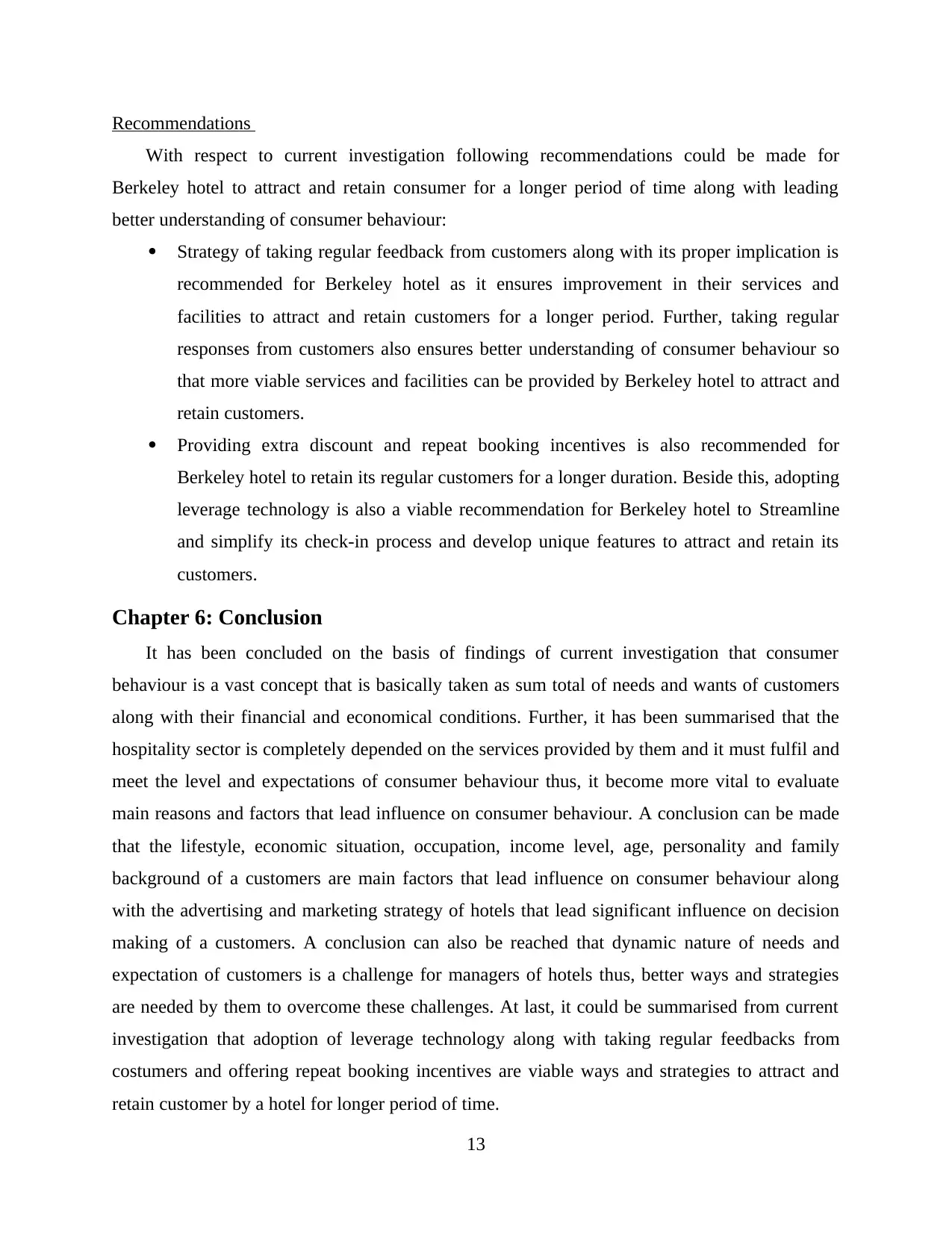
Recommendations
With respect to current investigation following recommendations could be made for
Berkeley hotel to attract and retain consumer for a longer period of time along with leading
better understanding of consumer behaviour:
Strategy of taking regular feedback from customers along with its proper implication is
recommended for Berkeley hotel as it ensures improvement in their services and
facilities to attract and retain customers for a longer period. Further, taking regular
responses from customers also ensures better understanding of consumer behaviour so
that more viable services and facilities can be provided by Berkeley hotel to attract and
retain customers.
Providing extra discount and repeat booking incentives is also recommended for
Berkeley hotel to retain its regular customers for a longer duration. Beside this, adopting
leverage technology is also a viable recommendation for Berkeley hotel to Streamline
and simplify its check-in process and develop unique features to attract and retain its
customers.
Chapter 6: Conclusion
It has been concluded on the basis of findings of current investigation that consumer
behaviour is a vast concept that is basically taken as sum total of needs and wants of customers
along with their financial and economical conditions. Further, it has been summarised that the
hospitality sector is completely depended on the services provided by them and it must fulfil and
meet the level and expectations of consumer behaviour thus, it become more vital to evaluate
main reasons and factors that lead influence on consumer behaviour. A conclusion can be made
that the lifestyle, economic situation, occupation, income level, age, personality and family
background of a customers are main factors that lead influence on consumer behaviour along
with the advertising and marketing strategy of hotels that lead significant influence on decision
making of a customers. A conclusion can also be reached that dynamic nature of needs and
expectation of customers is a challenge for managers of hotels thus, better ways and strategies
are needed by them to overcome these challenges. At last, it could be summarised from current
investigation that adoption of leverage technology along with taking regular feedbacks from
costumers and offering repeat booking incentives are viable ways and strategies to attract and
retain customer by a hotel for longer period of time.
13
With respect to current investigation following recommendations could be made for
Berkeley hotel to attract and retain consumer for a longer period of time along with leading
better understanding of consumer behaviour:
Strategy of taking regular feedback from customers along with its proper implication is
recommended for Berkeley hotel as it ensures improvement in their services and
facilities to attract and retain customers for a longer period. Further, taking regular
responses from customers also ensures better understanding of consumer behaviour so
that more viable services and facilities can be provided by Berkeley hotel to attract and
retain customers.
Providing extra discount and repeat booking incentives is also recommended for
Berkeley hotel to retain its regular customers for a longer duration. Beside this, adopting
leverage technology is also a viable recommendation for Berkeley hotel to Streamline
and simplify its check-in process and develop unique features to attract and retain its
customers.
Chapter 6: Conclusion
It has been concluded on the basis of findings of current investigation that consumer
behaviour is a vast concept that is basically taken as sum total of needs and wants of customers
along with their financial and economical conditions. Further, it has been summarised that the
hospitality sector is completely depended on the services provided by them and it must fulfil and
meet the level and expectations of consumer behaviour thus, it become more vital to evaluate
main reasons and factors that lead influence on consumer behaviour. A conclusion can be made
that the lifestyle, economic situation, occupation, income level, age, personality and family
background of a customers are main factors that lead influence on consumer behaviour along
with the advertising and marketing strategy of hotels that lead significant influence on decision
making of a customers. A conclusion can also be reached that dynamic nature of needs and
expectation of customers is a challenge for managers of hotels thus, better ways and strategies
are needed by them to overcome these challenges. At last, it could be summarised from current
investigation that adoption of leverage technology along with taking regular feedbacks from
costumers and offering repeat booking incentives are viable ways and strategies to attract and
retain customer by a hotel for longer period of time.
13
Secure Best Marks with AI Grader
Need help grading? Try our AI Grader for instant feedback on your assignments.
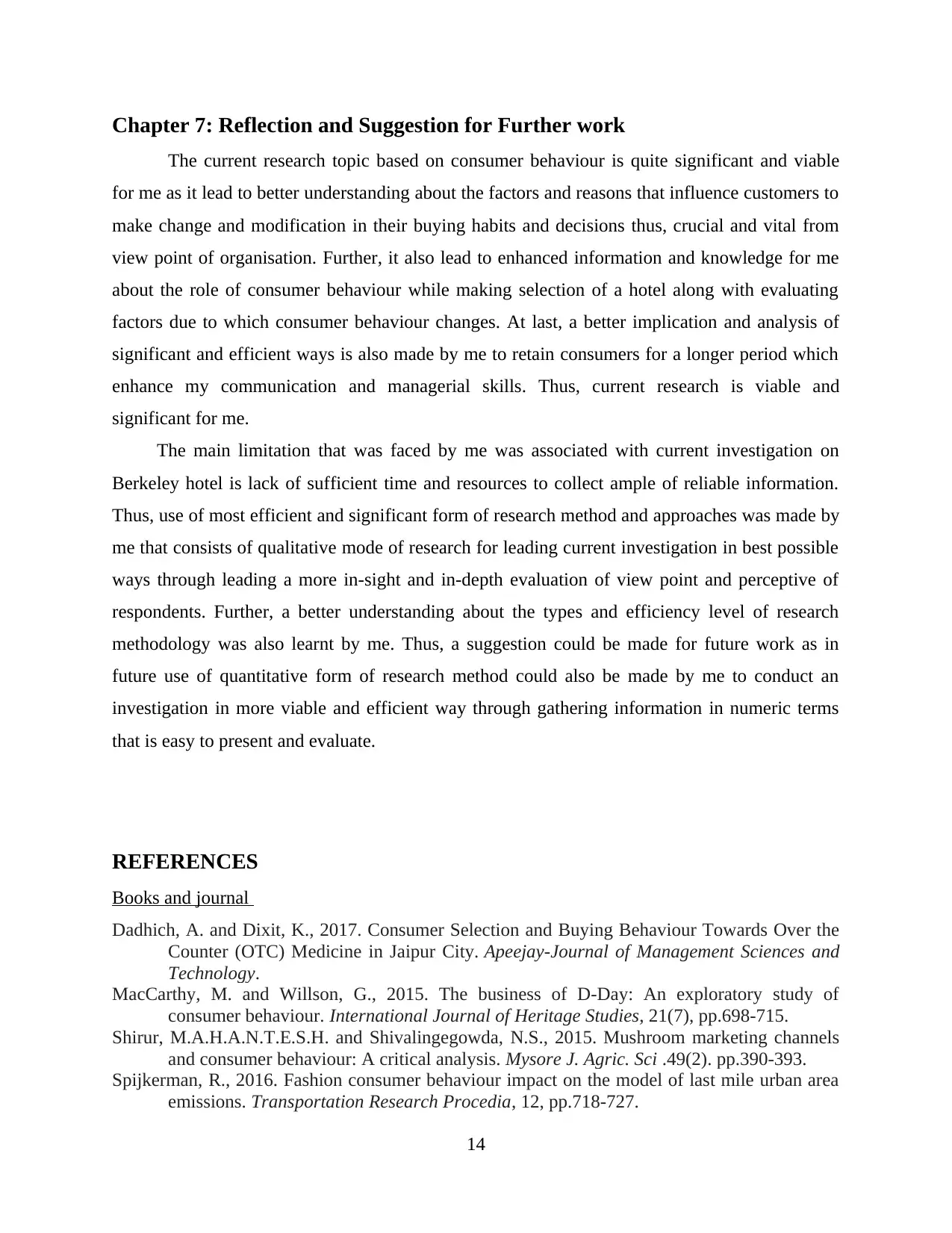
Chapter 7: Reflection and Suggestion for Further work
The current research topic based on consumer behaviour is quite significant and viable
for me as it lead to better understanding about the factors and reasons that influence customers to
make change and modification in their buying habits and decisions thus, crucial and vital from
view point of organisation. Further, it also lead to enhanced information and knowledge for me
about the role of consumer behaviour while making selection of a hotel along with evaluating
factors due to which consumer behaviour changes. At last, a better implication and analysis of
significant and efficient ways is also made by me to retain consumers for a longer period which
enhance my communication and managerial skills. Thus, current research is viable and
significant for me.
The main limitation that was faced by me was associated with current investigation on
Berkeley hotel is lack of sufficient time and resources to collect ample of reliable information.
Thus, use of most efficient and significant form of research method and approaches was made by
me that consists of qualitative mode of research for leading current investigation in best possible
ways through leading a more in-sight and in-depth evaluation of view point and perceptive of
respondents. Further, a better understanding about the types and efficiency level of research
methodology was also learnt by me. Thus, a suggestion could be made for future work as in
future use of quantitative form of research method could also be made by me to conduct an
investigation in more viable and efficient way through gathering information in numeric terms
that is easy to present and evaluate.
REFERENCES
Books and journal
Dadhich, A. and Dixit, K., 2017. Consumer Selection and Buying Behaviour Towards Over the
Counter (OTC) Medicine in Jaipur City. Apeejay-Journal of Management Sciences and
Technology.
MacCarthy, M. and Willson, G., 2015. The business of D-Day: An exploratory study of
consumer behaviour. International Journal of Heritage Studies, 21(7), pp.698-715.
Shirur, M.A.H.A.N.T.E.S.H. and Shivalingegowda, N.S., 2015. Mushroom marketing channels
and consumer behaviour: A critical analysis. Mysore J. Agric. Sci .49(2). pp.390-393.
Spijkerman, R., 2016. Fashion consumer behaviour impact on the model of last mile urban area
emissions. Transportation Research Procedia, 12, pp.718-727.
14
The current research topic based on consumer behaviour is quite significant and viable
for me as it lead to better understanding about the factors and reasons that influence customers to
make change and modification in their buying habits and decisions thus, crucial and vital from
view point of organisation. Further, it also lead to enhanced information and knowledge for me
about the role of consumer behaviour while making selection of a hotel along with evaluating
factors due to which consumer behaviour changes. At last, a better implication and analysis of
significant and efficient ways is also made by me to retain consumers for a longer period which
enhance my communication and managerial skills. Thus, current research is viable and
significant for me.
The main limitation that was faced by me was associated with current investigation on
Berkeley hotel is lack of sufficient time and resources to collect ample of reliable information.
Thus, use of most efficient and significant form of research method and approaches was made by
me that consists of qualitative mode of research for leading current investigation in best possible
ways through leading a more in-sight and in-depth evaluation of view point and perceptive of
respondents. Further, a better understanding about the types and efficiency level of research
methodology was also learnt by me. Thus, a suggestion could be made for future work as in
future use of quantitative form of research method could also be made by me to conduct an
investigation in more viable and efficient way through gathering information in numeric terms
that is easy to present and evaluate.
REFERENCES
Books and journal
Dadhich, A. and Dixit, K., 2017. Consumer Selection and Buying Behaviour Towards Over the
Counter (OTC) Medicine in Jaipur City. Apeejay-Journal of Management Sciences and
Technology.
MacCarthy, M. and Willson, G., 2015. The business of D-Day: An exploratory study of
consumer behaviour. International Journal of Heritage Studies, 21(7), pp.698-715.
Shirur, M.A.H.A.N.T.E.S.H. and Shivalingegowda, N.S., 2015. Mushroom marketing channels
and consumer behaviour: A critical analysis. Mysore J. Agric. Sci .49(2). pp.390-393.
Spijkerman, R., 2016. Fashion consumer behaviour impact on the model of last mile urban area
emissions. Transportation Research Procedia, 12, pp.718-727.
14
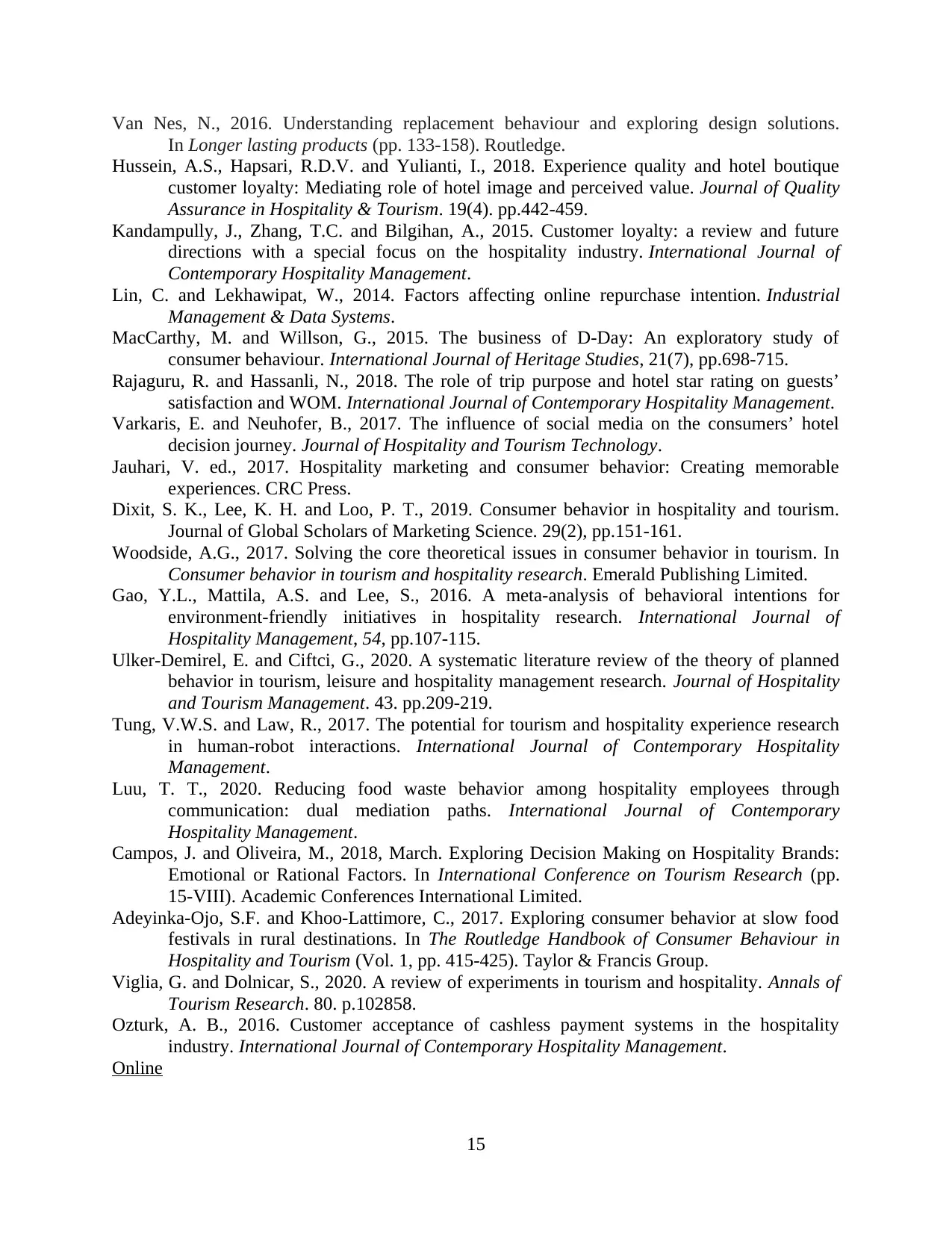
Van Nes, N., 2016. Understanding replacement behaviour and exploring design solutions.
In Longer lasting products (pp. 133-158). Routledge.
Hussein, A.S., Hapsari, R.D.V. and Yulianti, I., 2018. Experience quality and hotel boutique
customer loyalty: Mediating role of hotel image and perceived value. Journal of Quality
Assurance in Hospitality & Tourism. 19(4). pp.442-459.
Kandampully, J., Zhang, T.C. and Bilgihan, A., 2015. Customer loyalty: a review and future
directions with a special focus on the hospitality industry. International Journal of
Contemporary Hospitality Management.
Lin, C. and Lekhawipat, W., 2014. Factors affecting online repurchase intention. Industrial
Management & Data Systems.
MacCarthy, M. and Willson, G., 2015. The business of D-Day: An exploratory study of
consumer behaviour. International Journal of Heritage Studies, 21(7), pp.698-715.
Rajaguru, R. and Hassanli, N., 2018. The role of trip purpose and hotel star rating on guests’
satisfaction and WOM. International Journal of Contemporary Hospitality Management.
Varkaris, E. and Neuhofer, B., 2017. The influence of social media on the consumers’ hotel
decision journey. Journal of Hospitality and Tourism Technology.
Jauhari, V. ed., 2017. Hospitality marketing and consumer behavior: Creating memorable
experiences. CRC Press.
Dixit, S. K., Lee, K. H. and Loo, P. T., 2019. Consumer behavior in hospitality and tourism.
Journal of Global Scholars of Marketing Science. 29(2), pp.151-161.
Woodside, A.G., 2017. Solving the core theoretical issues in consumer behavior in tourism. In
Consumer behavior in tourism and hospitality research. Emerald Publishing Limited.
Gao, Y.L., Mattila, A.S. and Lee, S., 2016. A meta-analysis of behavioral intentions for
environment-friendly initiatives in hospitality research. International Journal of
Hospitality Management, 54, pp.107-115.
Ulker-Demirel, E. and Ciftci, G., 2020. A systematic literature review of the theory of planned
behavior in tourism, leisure and hospitality management research. Journal of Hospitality
and Tourism Management. 43. pp.209-219.
Tung, V.W.S. and Law, R., 2017. The potential for tourism and hospitality experience research
in human-robot interactions. International Journal of Contemporary Hospitality
Management.
Luu, T. T., 2020. Reducing food waste behavior among hospitality employees through
communication: dual mediation paths. International Journal of Contemporary
Hospitality Management.
Campos, J. and Oliveira, M., 2018, March. Exploring Decision Making on Hospitality Brands:
Emotional or Rational Factors. In International Conference on Tourism Research (pp.
15-VIII). Academic Conferences International Limited.
Adeyinka-Ojo, S.F. and Khoo-Lattimore, C., 2017. Exploring consumer behavior at slow food
festivals in rural destinations. In The Routledge Handbook of Consumer Behaviour in
Hospitality and Tourism (Vol. 1, pp. 415-425). Taylor & Francis Group.
Viglia, G. and Dolnicar, S., 2020. A review of experiments in tourism and hospitality. Annals of
Tourism Research. 80. p.102858.
Ozturk, A. B., 2016. Customer acceptance of cashless payment systems in the hospitality
industry. International Journal of Contemporary Hospitality Management.
Online
15
In Longer lasting products (pp. 133-158). Routledge.
Hussein, A.S., Hapsari, R.D.V. and Yulianti, I., 2018. Experience quality and hotel boutique
customer loyalty: Mediating role of hotel image and perceived value. Journal of Quality
Assurance in Hospitality & Tourism. 19(4). pp.442-459.
Kandampully, J., Zhang, T.C. and Bilgihan, A., 2015. Customer loyalty: a review and future
directions with a special focus on the hospitality industry. International Journal of
Contemporary Hospitality Management.
Lin, C. and Lekhawipat, W., 2014. Factors affecting online repurchase intention. Industrial
Management & Data Systems.
MacCarthy, M. and Willson, G., 2015. The business of D-Day: An exploratory study of
consumer behaviour. International Journal of Heritage Studies, 21(7), pp.698-715.
Rajaguru, R. and Hassanli, N., 2018. The role of trip purpose and hotel star rating on guests’
satisfaction and WOM. International Journal of Contemporary Hospitality Management.
Varkaris, E. and Neuhofer, B., 2017. The influence of social media on the consumers’ hotel
decision journey. Journal of Hospitality and Tourism Technology.
Jauhari, V. ed., 2017. Hospitality marketing and consumer behavior: Creating memorable
experiences. CRC Press.
Dixit, S. K., Lee, K. H. and Loo, P. T., 2019. Consumer behavior in hospitality and tourism.
Journal of Global Scholars of Marketing Science. 29(2), pp.151-161.
Woodside, A.G., 2017. Solving the core theoretical issues in consumer behavior in tourism. In
Consumer behavior in tourism and hospitality research. Emerald Publishing Limited.
Gao, Y.L., Mattila, A.S. and Lee, S., 2016. A meta-analysis of behavioral intentions for
environment-friendly initiatives in hospitality research. International Journal of
Hospitality Management, 54, pp.107-115.
Ulker-Demirel, E. and Ciftci, G., 2020. A systematic literature review of the theory of planned
behavior in tourism, leisure and hospitality management research. Journal of Hospitality
and Tourism Management. 43. pp.209-219.
Tung, V.W.S. and Law, R., 2017. The potential for tourism and hospitality experience research
in human-robot interactions. International Journal of Contemporary Hospitality
Management.
Luu, T. T., 2020. Reducing food waste behavior among hospitality employees through
communication: dual mediation paths. International Journal of Contemporary
Hospitality Management.
Campos, J. and Oliveira, M., 2018, March. Exploring Decision Making on Hospitality Brands:
Emotional or Rational Factors. In International Conference on Tourism Research (pp.
15-VIII). Academic Conferences International Limited.
Adeyinka-Ojo, S.F. and Khoo-Lattimore, C., 2017. Exploring consumer behavior at slow food
festivals in rural destinations. In The Routledge Handbook of Consumer Behaviour in
Hospitality and Tourism (Vol. 1, pp. 415-425). Taylor & Francis Group.
Viglia, G. and Dolnicar, S., 2020. A review of experiments in tourism and hospitality. Annals of
Tourism Research. 80. p.102858.
Ozturk, A. B., 2016. Customer acceptance of cashless payment systems in the hospitality
industry. International Journal of Contemporary Hospitality Management.
Online
15
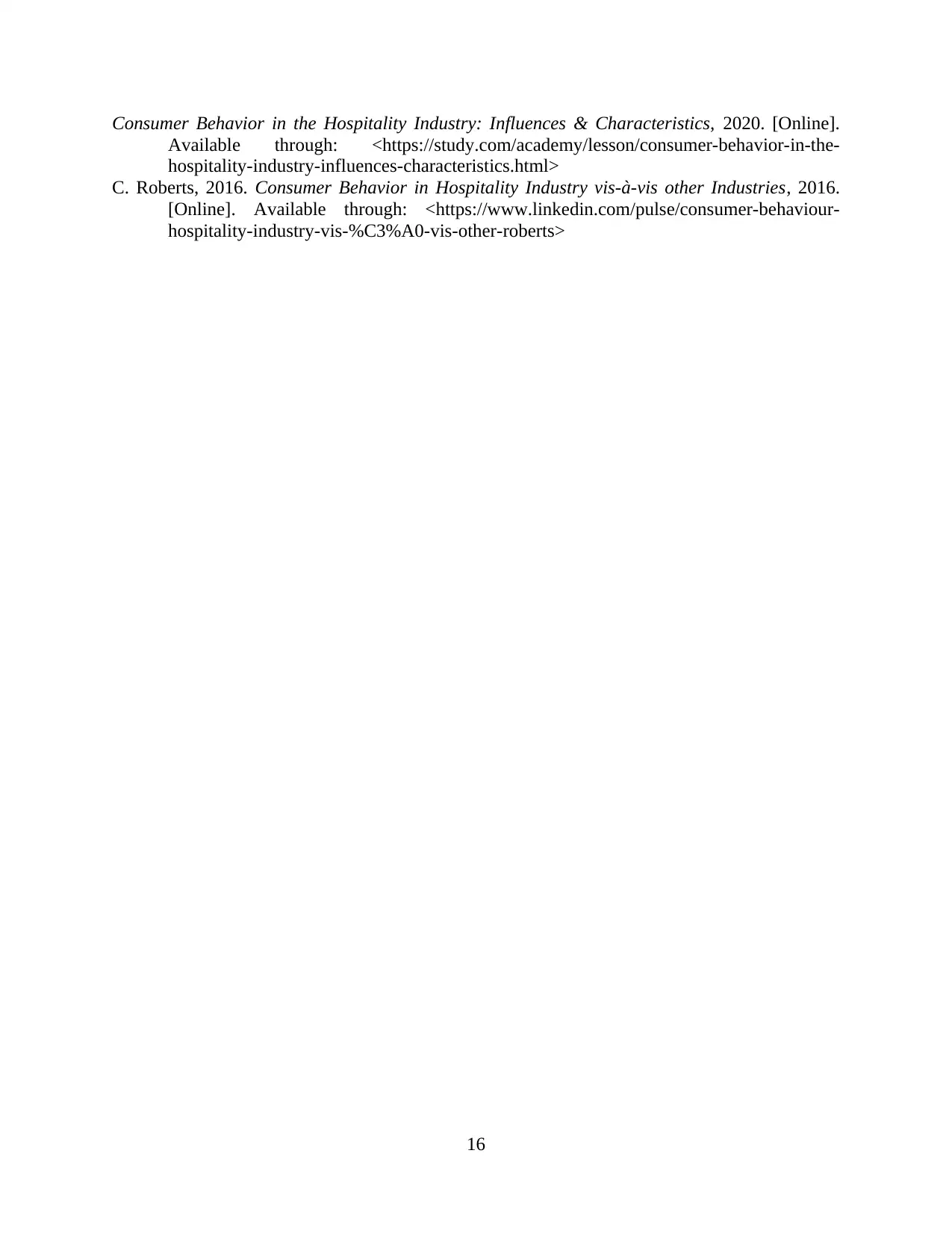
Consumer Behavior in the Hospitality Industry: Influences & Characteristics, 2020. [Online].
Available through: <https://study.com/academy/lesson/consumer-behavior-in-the-
hospitality-industry-influences-characteristics.html>
C. Roberts, 2016. Consumer Behavior in Hospitality Industry vis-à-vis other Industries, 2016.
[Online]. Available through: <https://www.linkedin.com/pulse/consumer-behaviour-
hospitality-industry-vis-%C3%A0-vis-other-roberts>
16
Available through: <https://study.com/academy/lesson/consumer-behavior-in-the-
hospitality-industry-influences-characteristics.html>
C. Roberts, 2016. Consumer Behavior in Hospitality Industry vis-à-vis other Industries, 2016.
[Online]. Available through: <https://www.linkedin.com/pulse/consumer-behaviour-
hospitality-industry-vis-%C3%A0-vis-other-roberts>
16
1 out of 19
Related Documents
Your All-in-One AI-Powered Toolkit for Academic Success.
+13062052269
info@desklib.com
Available 24*7 on WhatsApp / Email
![[object Object]](/_next/static/media/star-bottom.7253800d.svg)
Unlock your academic potential
© 2024 | Zucol Services PVT LTD | All rights reserved.





